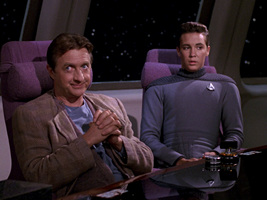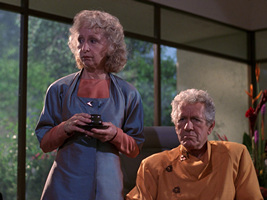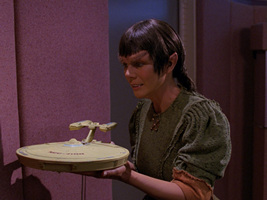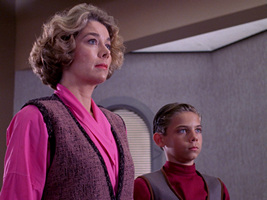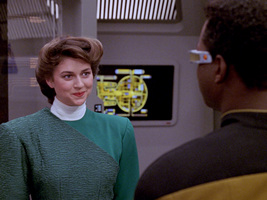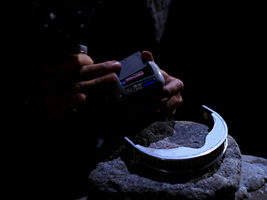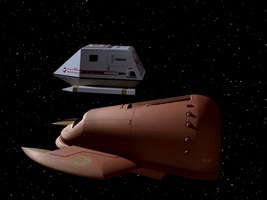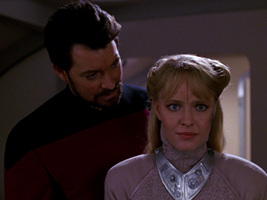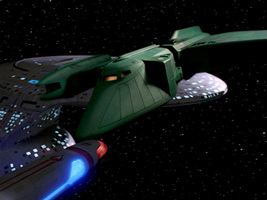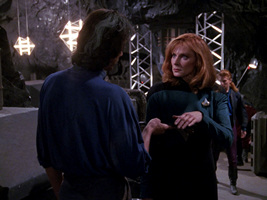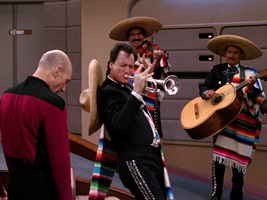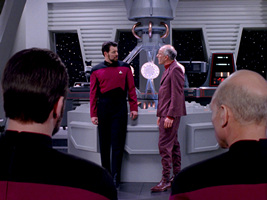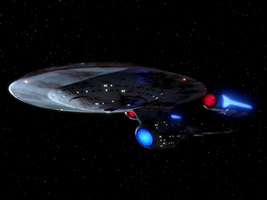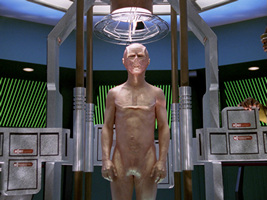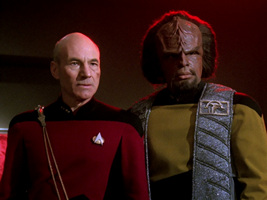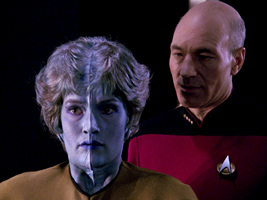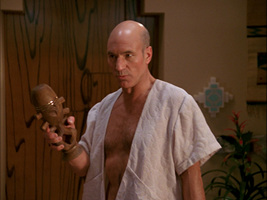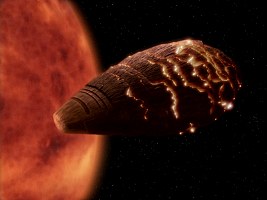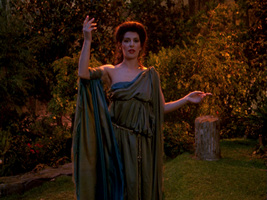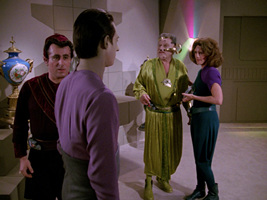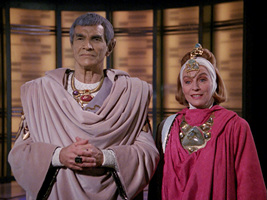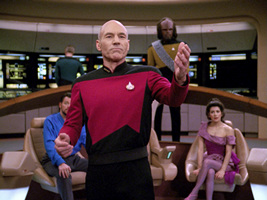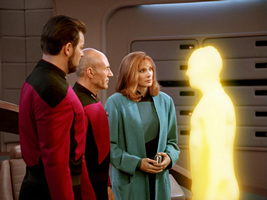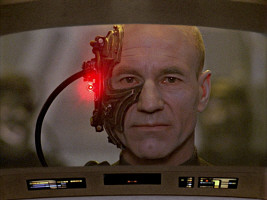The Next Generation (TNG) Season 3
Season 1Season 2Season 3Season 4Season 5Season 6Season 7
The Ensigns of CommandEvolutionThe SurvivorsWho Watches the Watchers?The BondingBooby Trap
The EnemyThe PriceThe Vengeance FactorThe DefectorThe HuntedThe High GroundDéjà Q
A Matter of PerspectiveYesterday's EnterpriseThe OffspringSins of the FatherAllegianceCaptain's Holiday
Tin ManHollow PursuitsThe Most ToysSarekMénage à TroiTransfigurationsThe Best of Both Worlds
I/II
The Ensigns of Command
Synopsis
Stardate 43133.3: The insectoid Sheliak demand that the human colony on the planet Tau Cygna V has to be evacuated within four days, otherwise they would remove the colonists by force. The planet is in their territory, according to the long-winded Treaty of Armens of 2255. No one in the Federation was aware of the colony that is located in a region of harmful radiation, but when Data takes a shuttle to the planet he finds 15,000 settlers who have adapted to the conditions. Data is on his own to convince the colonists to leave but he has a strong opponent in their leader Gosheven who does not mind the alien threat at all. Data eventually sees no other way but to destroy the water supply that the colonists depend on. In the meantime Picard studies the old treaty and finds a paragraph that buys the Federation several weeks for the evacuation.
Commentary
It is remarkable how few good Data episodes besides "The Measure of a Man" were in the first two seasons. He was always good enough to save the ship. His private life appeared only in the form of anecdotes. The creative staff were apparently cautious about centering a story around him, for they feared it could get rather silly than really interesting to write about someone who doesn't have and usually doesn't understand emotions. Although Data is finally given a chance to develop in "The Ensigns of Command", even including some rudimentary romantic relationship, I don't like it too much. Maybe it is because the whole plot reminds me too much of TOS: "This Side of Paradise", where there were forgotten settlers likewise, they became immune to fatal radiation likewise, it was a hard task to convince them to leave likewise, it required a bit of violence in the end likewise, and Spock fell victim to unexpected emotions a bit like Data does here.
The roles among the settlers are quite familiar too. Gosheven is the backward, egocentric and charismatic leader who would rather sacrifice the whole colony than abandon his leadership - and his entitlement of always knowing what is right or wrong. He isn't open to reason and he doesn't even listen to Data for a minute. Gosheven won't stay the last of his kind the Enterprise encounters. Ard'rian is the complete opposite to Gosheven. She quickly adapts to the new situation. She is interested in everything new anyway, most of all in Data's fascinating technology. This contrast is just too stereotypical to me, although I like Ard'rian quite a bit because in spite of all her knowledge she has preserved a refreshing naivety that allowed her to see more in Data than the friendly but emotionless android.
The almost equally important sub-plot of Picard negotiating with the Sheliak is more interesting because he manages to beat the Sheliak with diplomacy, turning their own treaty against them. He seems to have quite a bit of fun when the Sheliak finally have to come round.
Annotations
- Nitpicking:
- The hyperonic radiation is a lame plot device to get Data on a lone mission. Considering that the settlers managed to adapt, it should be well possible for humanoid crew members to go down in spacesuits or with other precautions, and for a limited duration. Well, if this were a Voyager episode, the Doctor would certainly develop an inoculation against the radiation in no time. ;-)
- I wonder why it should take a full four weeks to evacuate 15,000 people with shuttles. The Enterprise surely has 20 shuttles of various sizes at the very least, each of which we can estimate could carry an average of 8 people. With each shuttle making one flight per hour, this would take only a couple of days.
- There is one huge error in the sequence of events when the Enterprise is already at warp, heading for the Sheliak ship, but Geordi continues with his attempts to beam through the radiation. Isn't the radiation restricted to the planet or at most to the star system? And even if the radiation pervades a larger region of space, how can he test the transporter at warp?
- The script doesn't get its astronomical nomenclature right. There is a real star of the name Sheliak, but the species of this name inhabits a star system named "Shelia". Also, there is a real star of the name Tau Cygni, which happens to be in the same direction as Sheliak, but the script corrupts it to "Tau Cygna".
- When Data mentions that he needs a phaser, Ard'rian doesn't know what it is. This is odd, considering that the original colonists departed in 2274 when phasers were well known. On the other hand, perhaps they have just lost this knowledge.
- Remarkable dialogue: "Not that any computer we have is half as sophisticated as you." (Ard'rian) - "No, I would say not." (Data, maybe with a slight touch of arrogance, looking at a tin can of an android)
- Remarkable scene: Picard, with incredible calmness, walks around the bridge, polishes the dedication plaque, while the crew are tensely waiting for his response to the Sheliak.
- Remarkable ship: The Sheliak colony ship is a re-use of the Merchantman from "Star Trek III", with a few odd extensions. Unfortunately we get a rather close look at it in the episode, revealing that the ship is not all as advanced as we might expect it. The interior of the vessel with the light rods hanging from the ceiling, on the other hand, looks impressively alien.
- Remarkable fact: In the beginning we see a string quartet with a Vulcan and Data (violin), another woman (viola), and O'Brien (cello), playing Mozart's "Eine kleine Nachtmusik". Data thinks his playing is just an imitation of two great violinists, but Picard later comes to the conclusion that combining their ways of playing is innovative.
- Remarkable fun fact: Picard names the Grisellas to arbitrate in the conflict with the Sheliak, knowing that they are in their hibernation cycle.
- Remarkably bad translation: I usually don't mention it, but the German translation of this episode is simply awful. Just for the English-speaking readers to see what they are missing: "Hyperonic radiation" becomes "elementary radiation" - what a nonsense. "Tau Cygna" (which should have been "Tau Cygni" anyway, already in the English version) is initially called "Tau Ceta" and later "Tau Sigma".
Rating: 4
Evolution
Synopsis
Stardate 43125.8: The scientist Dr. Paul Stubbs has spent 20 years of research to observe a stellar phenomenon in the Kavis Alpha system that occurs only once in 196 years. His mission is endangered when the ship is plagued by computer malfunctions. Wesley discovers that the reason is his experiment to improve the performance of nanites that got out of control when the microscopic robots escaped and developed a consciousness and the ability to reproduce themselves. The nanites now occupy the ship's computer. Wesley reluctantly confesses his error to his mother Beverly, who has recently returned from Starfleet Medical. Stubbs, who is afraid that his experiment could fail, begins to destroy the nanites, whereupon the nanites attack him and sabotage life support on the ship. Data establishes a communication link with the nanites. Picard the urges Stubbs to apologize, upon which the nanites help to repair the computer. They are transferred to a planet in the Kavis Alpha system to continue their evolution.
Commentary
The third season (in airing order) begins with an episode that is almost as uninspiring as the clip show at the end of season 2. "Evolution" is a cookie-cutter story with its motive of the unexpected evolution of something that is just not supposed to be intelligent and of the obsessive behavior of scientists that would risk everyone's lives to accomplish their mission. While I appreciate the ethical commentary in "Evolution" about destroying an intelligent and possibly sentient species, this too is something we have had so many times before. We have seen all of the above in episodes such as TOS: "The Ultimate Computer" and TNG: "Home Soil". And the malfunctions on the ship are just like the ones only recently in "Contagion".
The only really interesting aspect of the episode may be Dr. Crusher's return to the Enterprise. I basically like her interaction with her son Wesley after not having been around for about a year. Their chemistry works out for me. But perhaps it was not the right episode for the two to come together again. It is a part of the story that the two keep talking at cross-purposes for a while, as Wes is concerned that his nanites get the ship into trouble, whereas his mother thinks he needs to relax and date a girl. I think Wesley's latter "problem" is overrated and should have been kept out of the story. Thinking even further about it, it may have been better to show a real falling out of the two characters, upon which Wesley would have avoided his mother (to focus on his dilemma with the nanites), which Beverly might have falsely interpreted as her fault.
What I don't like about Wesley's involvement is that he gets the ship into trouble but contributes comparably little to resolve the situation. He should have been given or should have taken the chance to redeem himself, especially considering that he seems to know as much about the nanites as hardly anyone else on the ship.
Regarding Stubbs, I don't care for him at all. At the beginning of the episode he begins to socialize with Wesley, and at this point it looks like he could even become some sort of a father figure. But the hope that this thread could continue is disappointed in the following. The two follow their own paths, rather than working together in some fashion. Moreover, I doubt that Stubbs could be a good father with his patronizing way of dealing with people. As already mentioned, he reminds me very much of Richard Daystrom and the likes and perhaps even more of the equally smug Ira Graves (TNG: "The Schizoid Man"). Moreover, he invokes his being authorized directly by Starfleet Command, like in the worst days of Federation bureaucrats who frequently got the ship in trouble in TOS against better judgment, apparently just to prove their power. Overall TNG continues to give scientists a bad name.
On the bright side, "Evolution" has superb visual effects of the Kavis Alpha stellar phenomenon, as well of the Enterprise, which is shown from the better looking dorsal side more often than ever in this episode.
Annotations
- Nitpicking: Data states that "there has not been a systems-wide technological failure on a starship in 79 years." He obviously forgets what happened on the Yamato and the Enterprise in "Contagion" just a couple of months earlier.
- Remarkable dialogue: "Good Lord, you are talking about machines with a screw loose. Simply turn them off and be done with them." - "Doctor Stubbs, your own actions have provided evidence to the contrary. When you destroyed the nanites in the core, they responded by interfering with our life support systems. It is difficult to accept these as random actions by machines with loose screws. In effect, you may have proven that the nanites do have a collective intelligence." (Stubbs and Data)
- Remarkable costume: We can see the new two-part uniform with the collar (as opposed to the jumpsuit of season 1 and 2) for the first time. Initially only the higher-ranking officers wear the new uniform.
- Remarkable probe: Stubbs's "Egg" is a re-use of the containment module from "The Child".
- Remarkable fact: The nanites are made in a plant in Dakar, Senegal.
Rating: 3
The Survivors
Synopsis
Stardate 43152.4: The entire colony on Delta Rana IV has been destroyed by an unknown enemy - except for the house of Kevin and Rishon Uxbridge. After an away team has visited the survivors, Deanna is plagued by a penetrative melody in her mind. An alien ship attacks the Enterprise in orbit, the Enterprise has to retreat. The alien ship returns and destroys the Uxbridge house - but after some time the house reappears. It turns out that Kevin Uxbridge is not human, but an immortal Douwd who refused to fight against the attacking Husnock, even as they killed all the 10,000 colonists, including his human wife Rishon. Furious about his loss, Kevin then wiped out the whole Husnock civilization, numbering 50 billion. Ashamed of what he had done, his only intention was to veil his crime and stay alone.
Commentary
The Enterprise encounters someone or something that is not what he or it seems to be, an alien vessel keeps attacking, and Troi suffers once again. There is nothing really interesting about this episode until the resolution that is a surprise to everyone but Picard, who takes a certain pleasure in playing a real-life Dixon Hill. It may have been the author's intention to keep up the suspense until the culmination at the very end when Kevin Uxbridge reveals his true nature and the crime he has committed. However, it just doesn't work out because the thrill is gone much sooner. Kevin and Rishon's continued senile stubbornness soon gets boring, even obnoxious. A bit like the melody in Deanna's mind.
Kevin Uxbridge's whole ploy is pointless, or he is quite stupid for an almost omnipotent being. He could have cloaked his house in some fashion, so the Enterprise would have found no one to tend to, and the episode would have lasted just five minutes. Picard, on the other hand, seems to be all too concerned with solving the puzzle instead of just taking the two old people aboard without asking them, if necessary. Exactly this he does anyway in the end, when he just orders them to be beamed up. Regarding Picard's hesitation, is there any alternative to evacuating them, considering that the whole planet has been devastated? Without Picard's unnecessary patience Kevin Uxbridge would have been forced to reveal his true nature much earlier; the captain would have saved a lot of trouble for himself, for his shipmates and for the ship itself. And most importantly for Deanna. Well, in this case the episode may have been perhaps 15 minutes long, so the thin plot was extended to 45 minutes.
Speaking of stretching the plot, despite some action with the Husnock ship the episode is extremely verbose. Everything that happens is described verbally, is further explained, commented on or discussed in some fashion. In this regard it is ironical that Kevin Uxbridge's true nature remains only a footnote, just as the race of the Husnock that the Douwd destroyed.
There is one really good scene in the episode, when Picard turns to Worf after the Husnock ship has been detected for the first time, and only with a glance reminds him of his promise that there should be no other ship in the system, which leaves the Klingon baffled and embarrassed. In contrast, I absolutely hate the idea of the noose trap that Riker gets caught in. This is utterly gratuitous and unbecoming of Kevin Uxbridge.
Annotations
- Nitpicking:
- It is strange that there was obviously enough time to call a meeting of all colonists before the Husnock launched their attack, which is when Kevin decided not to fight. I also can't imagine that the colonists really saw a chance against the Husnock, no matter how the enemy announced his arrival. Maybe they just waited for Husnock ground troops to take as many as possible with them until the inevitable end, and they didn't anticipate that the starship could erase the colony at the push of a button. But in this case it is even more mysterious how they could have been warned in the first place. Maybe it was Kevin?
- Why does Kevin Uxbridge restore the house so soon after it has been "destroyed" by the alien vessel? Wouldn't he detect the continued presence of the Enterprise in a higher orbit? Or was he going to give up his ploy anyway?
- Picard tells Uxbridge: "We're not qualified to be your judges. We have no law to fit your crime." Actually, there is definitely a law concerning genocide, but perhaps none would apply to lifeforms like Kevin.
- Remarkable realism: It took the Enterprise three days to Rana IV. It is always good to see that starships don't arrive "at once" wherever they are needed.
- Remarkable ship: I really like the Husnock ship, which was obviously not needed any longer (as the Husnock are extinct now) and was reworked to the Jovis. An interesting feature about the systems of the Husnock ship is something that looks a lot like Borg shields.
- Remarkable facts:
- Rishon and Kevin Uxbridge are botanists, originally from the aquatic city New Martim Vaz in Earth's Atlantic Ocean. They have been residents of the Rana IV colony for five years. Rishon is 82 years old composer of Tao classical music. Kevin is 85 (at least that's what the records say) and a specialist in symbiotic plant life. The two have been married for 53 years.
- Picard makes a reference to renegade Andorians who hid their ships in the Triangulum system once, but doesn't mention a date.
Rating: 2
Who Watches the Watchers?
Synopsis
Stardate 43173.5: The Enterprise rushes to Mintaka III to repair the power generator of a "duck blind" for covert cultural observation. Liko, one of the indigenous proto-Vulcans, is injured when he investigates the now exposed strange structure of the duck blind. Dr. Crusher has him beamed up to the ship for treatment, where he briefly wakes up and looks into the face of Captain Picard. Upon his return to the planet he tells everyone that he was dead, and that "The Picard" saved him. As one scientist, Palmer, is still missing on the planet, Troi and Riker beam down in disguise, only to notice that the Mintakans have found him. Riker manages to have Palmer beamed up without the Mintakans noticing it, whereupon they take Troi hostage to please "The Picard". Picard decides to beam up Nuria, the leader of the village, and demonstrate to her that he is not unlike her, and that his power is neither supernatural nor unlimited. Nuria eventually believes him when Warren dies, a woman who suffered severe injuries in the duck blind accident. Back on the planet Liko still doesn't believe that "The Picard" is not immortal, until he injures the captain with a shot from his bow.
Commentary
This may be the episode with the best dramaturgy in TNG so far, even surpassing "The Measure of a Man", "A Matter of Honor" and "Q Who". It clearly shows that, after two seasons, the writers and production staff have finally learned to link scenes with each other and to let dialogues come to a point. It is entertaining and at the same time insightful, with a pleasant absence of technobabble, of unpleasant guests of the week, of "ship in danger" or similar TNG clichés.
It's a quite good, but not a perfect episode. Of all characters it is Jean-Luc Picard who leaves a problematic impression here. When the Mintakan patient Liko is in sickbay, Picard doesn't care about him or ask how he is doing at all. At least he is consequential, as he treats him like the other "savages" (the ones from 20th century Earth) he met in "The Neutral Zone". The only thing Picard has in mind is quoting the Prime Directive, and he doesn't really accept Beverly's valid objection that this man was hurt in the first place on behalf of (or by the fault of) the Prime Directive. I wouldn't have expected him to be such a cold-hearted bureaucrat.
The second thing I am annoyed about is that Picard rejects any kind of religion and equates it with superstition. Barron insinuates that a religion could give rise to "inquisitions, holy wars, chaos", which Picard finds "horrifying". The two, however, just look at the negative effects of religion in human history, neglecting that the same level of intolerance and violence may exist and does exist in a secular world just as well. Moreover, rather than obeying the letters of the Prime Directive that would forbid any intervention with alien civilizations in any direction, they give a personal one-sided interpretation of why it exists. Picard's attitude is consistent with "Justice" though, where he tried to secularize the Edo culture likewise.
Picard apparently doesn't want to *allow* the people to believe in something supernatural, not only because he is the subject of their religion and he knows that he is not supernatural, but because of his stance that any form of religion must be backward. While his actions may or may not comply with the Prime Directive, he doesn't give the Mintakans the benefit of the doubt. The discovery of "miracles" could spark a something like religious revolution on Mintaka III, but more likely the events would fall on deaf ears elsewhere on the planet. And who knows whether all the efforts to "repair the damage" don't have just the contrary effect. Actually, I couldn't imagine anything more counterproductive in Picard's situation than showing Nuria around on the Enterprise and then trying to explain to her the difference between caves, huts and starships! Well, the other members of the crew contribute their share of mistakes too that only aggravate the situation.
I like the Mintakans very much. They are more enlightened than our human ancestors must have been in the "Dark Ages" mentioned in the episode - although I still don't think this has anything to do with having a religion or not. Anyway, the Mintakans can do without religion until "The Picard" appears. I'm not sure if the way the Mintakans react to "The Picard" is that plausible though. They seem to be quite convinced of and quite content with their secular world but some of them suddenly behave like religious fanatics. I doubt that any civilization, even less "rational" ones, would unearth old myths and begin to burn witches. On the other hand, maybe "The Picard" marks the beginning of a "New Age" movement, something that especially enlightened civilizations seem to be susceptible to. I'm thinking of developments in the real world that are reflected in episodes like "Devil's Due", "Rightful Heir" and, last but not least, DS9: "In the Hands of the Prophets".
Although it is controversial (or just because of that), this is one of the key episodes to the Prime Directive. The influence on the Mintakan culture is not (yet) destructive, but they are not ready to encounter aliens and their technical possibilities either.
Final remark: Although the episode title might suggest something like that, the question if it is appropriate to spy on civilizations like watching rats in a cage is not an issue here. This will be the case as late as in "Star Trek: Insurrection" where we will see a "duck blind" again, and Anij expresses her displeasure about the Federation and Son'a peeping on the Ba'ku.
Annotations
- Nitpicking:
- When Riker (in Mintakan disguise) calls the ship, his priorities have strangely shifted. The news he reports is not that the Mintakans have just found the injured Palmer that he and Troi were looking for, but that they have chosen to worship Picard as their god!
- After Troi has lured the villagers away, why does Riker mind carrying Palmer off the building when he could signal the transport right away?
- Picard could have chosen a less dangerous trial than being shot with a bow!
- Continuity: There is good continuity when Picard mentions the method to remove a person's short-term memory devised by Dr. Pulaski in "Pen Pals". The procedure fails on Liko.
- Remarkable scene: When Nuria is beamed aboard the ship, Picard introduces himself with the words: "My name is Jean-Luc... Picard", knowing that Nuria would be frightened by "The Picard". She falls on her knees, and this is both amusing and disturbing.
- Remarkable location: The location shootings took place at Vasquez Rocks.
- Remarkable dialogue: "A very sensible people. For example, Mintakan women precede their mates. It's a signal to other women." - "'This man is taken, get your own?'" - "Not precisely. More like, 'If you want his services, I'm the one you have to negotiate with.'" - "What kind of services?" - "All kinds." - "They are a sensible race." (Troi and Riker)
- Remarkable facts:
- The Mintakans are called "proto-Vulcan" and "their evolution parallels Vulcan", but it is not mentioned if and how they could be related to Vulcans.
- Picard will decorate his ready room on the Enterprise-D and -E with the Mintakan tapestry he receives as a gift.
- The power source of the duck blind has 4.2 gigawatts, according to Riker this would be enough to power a phaser array or a subspace transmitter.
- Remarkable fun fact: Nuria is probably the first person to admire Picard's old Constellation-class model (the yellow one).
Rating: 7
The Bonding
Synopsis
Stardate 43198.7: While studying the remains of the extinct Koinonians, archeologist Marla Aster is killed by a still active bomb. She leaves behind her son Jeremy. "Marla Aster", however, reappears and creates a perfect life for Jeremy. Actually, this "Marla" was created by non-corporeal aliens on the planet who once witnessed the destruction of the Koinonians. They feel sorry about Jeremy's loss and try to compensate for it. Picard explains that the boy needs to stay in the real world and make real experiences. He calls Wesley, who once lost his father and learned to cope with it. The alien entity retreats. Worf, who feels responsible for the boy because Marla Aster was killed in his away team, performs the R'uustai with Jeremy, a Klingon brotherhood ritual.
Commentary
"The Bonding" is remarkable in just one regard. It is the first Star Trek episode in which the death of a "less important" crew member is more than only a side note. It matters that Lieutenant Marla Aster is gone, to her son Jeremy and to those who worked with her and who now have an obligation to care about the boy. Ironically we never see Marla Aster alive in the episode (except in Jeremy's video recordings) and we only hear the audio transmission of the explosion that kills her. I think it is an important part of the story that her death doesn't come across as thrilling in any way, unlike it was with previous crew deaths on TNG and especially the many redshirt killings on TOS where just the fact that anyone was killed mattered but not the person.
After Marla Aster's death several members of the crew are involved in helping the boy in some fashion, while they have to cope with the death of the lieutenant themselves, as well as with their past histories of losing crewmates and relatives. I especially like how Picard, Wesley and Worf are woven into the story. Picard is the one whose duty it is to convey the bad news, just as he did after Wesley's father had been killed. Wesley is naturally reminded of his father's death but he is reluctant to allow his feelings to resurface and talk to Jeremy. Worf thinks he is responsible of Marla Aster's death as he led the away team; furthermore he is an orphan too. He feels an obligation to tend to Jeremy, but with his proposal of the R'uustai he is rushing it as Troi correctly recognizes.
In its first 20 minutes the story never gets exciting or revealing but at least it remains a series of decent character studies. As soon as "Marla Aster" enters the scene, resurrected by an alien intelligence, the story begins to go downhill. It is very disappointing in the first place that an energy lifeform appears and takes on the shape of a crew member, because this happens frequently on Star Trek. I think the whole alien involvement inappropriately draws the focus away from Jeremy's loss and turns it into a problem of how to deal with an unwanted invader. I would have preferred the original story by Ron D. Moore, in which Jeremy would have recreated his mother on the holodeck.
What "Marla Aster" wants to do for Jeremy never makes sense to me. As it is unfortunately customary in Star Trek, the non-corporeal aliens of that planet look down on biological lifeforms and their tendency to destroy each other, just as the Koinonians once did. They obviously didn't understand the Koinonians, and they don't have the slightest idea what the boy really needs either. Yet, they care for Jeremy Aster and they go into great lengths to give him back his mother.
The crew's debate with "Marla Aster" goes on and on, but the aliens ignore all the valid points brought forward by Troi and Picard, such as "It is at the heart of our nature to feel pain and joy. It is an essential part of what makes us what we are." It is an illogical move that eventually changes the aliens' minds for reasons I don't understand. After everything else has failed, Picard calls Wesley. Wesley tells "Marla" and Jeremy that he held a grudge against Picard because his father died under Picard's command. The intended effect of Wesley's testimony on Jeremy is that he should be angry at Worf. And that he should perform the R'uustai ritual with him. Yeah right. They are telling Jeremy how to feel about his loss and how to deal with it, thereby rushing a process of mourning that should take many weeks. As if the boy wasn't traumatized enough. But strangely this has a bearing on the aliens who end the illusion, although it doesn't concern the boy's mother or them in any way how Jeremy feels about Worf. Oh well, Jeremy finally complies with everyone's wishes how he should deal with his loss and he begins to cry. And when children cry it always has a deeper meaning and it must change something. At least on TV.
Annotations
- Remarkable scene: Worf extinguishes a candle with his dagger to honor Marla Aster.
- Remarkable facts: Jeremy is twelve years old. His father died of Rushton infection. He has an aunt and uncle residing on Earth.
- Crew death: Lt. Marla Aster
Rating: 2
Booby Trap
Synopsis
Stardate 43205.6: After investigating an intact 10,000 year old Promellian battlecruiser inside an asteroid field the Enterprise is stuck in a network of energy absorbers. Every attempt to activate the propulsion systems results in more energy being drained, while the ship is bombarded with lethal radiation. On the holodeck Geordi creates the construction site of the Enterprise engines, and together with a holographic representation of the engineer Leah Brahms -to whom he is drawn quite a bit- he devises a method to escape by giving the computer complete control of the Enterprise. When he tells Picard that the alternative option, to steer the ship manually, would have the same chance of success, Picard decides in favor of the latter. He takes the helm, briefly fires the impulse engines to overcome the inertia and controls the ship with the thrusters. Taking advantage of the gravitational pull of the asteroids Picard eventually manages to break the ship free.
Commentary
"Booby Trap" is an episode that thrives on clever writing and that delves into the ship's technology without much technobabble. I particularly like the realism in the two possible solutions that Geordi outlines. The first one would be to give the computer full control of the ship's engines, which may or may not break the ship free before the radiation dose has become lethal. I take it for granted that when Geordi runs the same simulation of the computer-controlled escape multiple times and the results differ, this is due to a built-in statistical variation of parameters (which is called Monte Carlo simulation in real engineering). The second solution and the one ultimately chosen is to use minimum power to overcome the inertia and to steer the ship manually just with the thrusters, taking advantage of the gravitational forces of the asteroids (the latter to Data's surprise, although the android should be familiar with basic physics and should have anticipated the possibility).
It is the highlight of the episode when Picard takes the helm and controls the ship with just the buttons on the console. It is the second time in the episode that Picard has all the fun, after he already used his prerogative to lead the away team to the Promellian battlecruiser, a ship that already impressed him as a child.
Geordi's romance on the holodeck is not quite as convincing. It is contrived that he would fall in love with the holographic Leah Brahms only a few hours after his unsuccessful date with Christy. It is also unrealistic that he would lock himself up the way he does here, without involving anyone of his team in the investigation. Furthermore, the holographic Leah Brahms created at Geordi's request is too obviously designed to be attractive for Geordi, although he didn't ask for it. Well, I like her change from the talking computer image to the recreation of her personality with a "9.37% margin of error". What a difference!
Annotations
- Continuity:
- Geordi has a problem with dating women although he previously gave Wesley advice on girls in TNG: "The Dauphin".
- On Picard's question whether anyone used to build model ships Worf replies "I did not play with toys", although in TNG: "Peak Performance" he did build a model ship (or at least tried to). Only O'Brien affirms the question, which Picard will refer to in TNG: "All Good Things", set at the time of "Encounter at Farpoint" when he couldn't know of O'Brien's hobby yet.
- Leah Brahms will return in person in TNG: "Galaxy's Child".
- Remarkable quote: "I'm with you every day, Geordi. Every time you look at this engine, you're looking at me. Every time you touch it, it's me." (Leah Brahms)
- Remarkably nonsensical name: "Aceton assimilators" sounds like the solvent acetone is involved in some fashion.
Rating: 8
The Enemy
Synopsis
Stardate 43349.2: An away team discovers a Romulan shuttle crashed on the inhospitable Federation planet Galorndon Core and rescues one survivor, Pahtak. Geordi goes missing, and as the transport window is closing, the away team has to beam up without him. Wesley prepares a neutrino emitter that could penetrate the electromagnetic storms on Galorndon Core and help locate Geordi once he finds and activates it. Meanwhile Geordi, however, is being held hostage by a second Romulan survivor, Bochra. As they notice that the conditions on the planet lead to brain degeneration and Geordi's VISOR interface fails, the two work together to find the neutrino emitter. Aboard the Enterprise Worf is the only one who could help Pahtak with a blood transfusion, but he as well as Pahtak refuse; the Romulan dies. The situation gets critical as a Warbird commanded by Commander Tomalak approaches and demands that Pahtak, the allegedly only survivor, be returned. In the meantime Geordi and Bochra have activated the neutrino source, upon which Picard lowers the shields and beams them directly to the bridge for Tomalak to see. Bochra returns to the Romulans.
Commentary
In its first two seasons TNG was obviously careful not to use up the Romulans as the new old enemies of the Federation in too many episodes. Their first appearance in "The Neutral Zone" was impressive but didn't tell us more than that they were back on the scene. In "Contagion" we could see them a second time, again without going into the details of the Federation-Romulan relations and without becoming in any way personal. This should not be mistaken an unfortunate omission, however. On the contrary, I appreciate that in these early episodes the depiction of the Federation-Romulan conflict remained realistic and consistent. It is a conflict whose roots can be found in history, rather than in recent events. Yet, both sides are anxious to find the rationale for everything that happens in the present, in alleged mistakes of the other side. With just a bit more open-mindedness and a minimum of trust the Federation and the Romulans would have discovered that there is presently no reason for them to go to war again. Well, at this point of the series it is still possible that the Romulans are indeed planning an invasion. But the fact that in "The Enemy" crew members from both sides overcome their preconceptions and their mistrust only corroborates that there is much room for improvement in the Federation-Romulan relations.
The narrative exhibits an remarkable dualism. While Geordi and Centurion Bochra work together on the planet in order to survive, Worf refuses to donate blood for the other Romulan, Patahk. Geordi's part of the story is very Trek-like, and it is a bit like his open-mindedness towards the Romulan centurion makes up for Kirk's failure to communicate with the Gorn captain in a somewhat similar situation in TOS: "Arena". Worf's part is rather contrived to start with, as he of all Enterprise crew members, the Klingon whose family was slain by Romulans, is the only one whose blood is compatible with Patahk's. While I'm not so happy with the circumstances, it is a positive surprise (for the story, not for those who want to save Patahk) that Worf sticks with his decision not to help Patahk until the bitter end. It helps a great deal to consolidate Worf's character as that of a Starfleet officer, who is aware of his duties but who remains all Klingon whenever he has the choice. On the other hand, two possible story variants in this context remain unexplored. What if Picard had ordered Worf to help Patahk, and Worf had rejected it? What if Patahk had begged Worf to save his life, rather than insulting him almost with his last breath, and Worf had still refused? The way it actually happens Patahk's stance that he doesn't want to be saved by "Klingon filth" anyway distracts very much from Worf's mistake.
It is just as interesting to watch Picard and Riker in this episode. Picard's actions are governed by reason of state; he is uncompromising towards Tomalak most of the time. On the other hand, the greater goal to keep the Romulans away coincides with the effort to rescue Geordi from Galorndon Core. We may wonder what Picard would have done, had he been forced to leave the planet and Geordi, which is another story possibility that remains unexplored. Regarding Picard, I only don't like his address to the Romulans at the end of the episode, when it is required for the Enterprise to lower the shields. Instead of preaching a sermon he should have said the same in fewer words, that he is taking the first step by lowering the shields.
Riker, on the other hand, seems to be on edge for much of the time. He feels responsible for the man he had to leave behind on the hostile planet, and there are signs of protest every time Picard does something that could jeopardize Geordi's rescue. I like Jonathan Frakes very much in this episode, in which he plays a different Riker who is not "jovial" at all. Well, perhaps a conflict between Riker and Picard is another missed story opportunity, but I probably should enjoy the story as it is, with an intelligent setup and with overall excellent interaction of the characters.
Annotations
- Nitpicking: Why doesn't Geordi even try to use his phaser to signal the ship? If there is anything that the Enterprise might detect in the electromagnetic storm, it should be a phaser blast.
- Remarkable quote: "Commander Tomalak. It would appear our away team has rescued a second man from your one-man ship." (Picard)
- Remarkable appearance: Andreas Katsulas can be seen for the first time in his role as Commander Tomalak.
Rating: 7
The Price
Synopsis
Stardate 43385.6: The Barzanians arrange a conference on the Enterprise with the Federation, the Caldonians and the Chrysalians to sell the control over an allegedly stable wormhole in their space. The Ferengi invite themselves to the negotiations, and they disable the Federation negotiator Mendoza, so Will Riker has to take his place. Deanna Troi falls in love with the delegate representing the Chrysalians, the human Devinoni Ral, who has not told anyone that he is actually one quarter Betazoid and uses his empathic powers in the negotiations. A Federation and a Ferengi shuttle set out to explore the wormhole. Geordi and Data discover that the far end is unstable. The crew of the Ferengi shuttle don't listen to the warnings, and they get stranded in the Delta Quadrant when the entrance of the wormhole shifts. In the meantime DaiMon Goss of the Ferengi ship incites a conflict with the Enterprise over the wormhole, which leads Bhavani of the Barzanians to come to an agreement with Ral. Deanna, however, senses that Ral and Goss are working together. All efforts turn out useless anyway when Data and Geordi return and report that the wormhole is unstable and therefore not suited for space travel.
Commentary
Deanna's character urgently needed some more involvement in the stories at the time this episode was made. Discounting "The Survivors", where she was just tormented without being able to contribute much, the last time Deanna was in the focus of interest was in "The Child". I think the writers so far had a hard time coming up with stories for Deanna, because she normally wouldn't be in the front line of a fight, of scientific exploration or of medical aid. So I think it was a good idea to write a love affair and a conflict of interest for Deanna. Well, Devinoni Ral is another disagreeable guest character with a lack of decency, who is holding a secret (the #1 TNG cliché). But after my initial irritation about how easily Deanna falls for Ral despite his obvious flaws, I think their chemistry works well. I also like Ral's interaction with Riker, in their two-fold rivalry for the wormhole and for Deanna's love. I only can't help the impression that after noticing that such a story setup can work, guest characters of later episodes were frequently custom-tailored to interact with Deanna, as fellow telepaths, lovers, mental torturers, or all of the above.
Overall "The Price" is an intelligently written episode that skillfully develops a diplomatic affair from a genuine science fiction scenario. The love affair of Deanna and Devinoni Ral is embedded into the story without appearing contrived. The episode has a surprising turning point when it is found that Devinoni and the Ferengi are working together to trick the Barzanians into making a deal with Devinoni. I am glad that Deanna herself uncovers the ruse, thereby proving that she is not a stereotypical lovesick female crew member who allows herself to be manipulated by the man she loves. The second turning point follows almost immediately when Geordi and Data return from the wormhole and reveal that the phenomenon is actually unstable and therefore worthless for Devinoni who has just purchased the transit rights. The futility of this situation is worked out well, especially when Riker sarcastically congratulates Devinoni.
On the downside, the Ferengi are stupid as always. We have to wonder how they could ever become a major galactic power, considering how easily they abandon common sense whenever there might be a business opportunity. Regarding the Ferengi, I also would have wished that Dr. Crusher had discovered at some point that it was the Ferengi who disabled Mendoza by triggering an allergic reaction.
Annotations
- Continuity:
- This episode introduces the division of the galaxy into four quadrants, Alpha, Beta, Gamma and Delta. So far "quadrant" used to have the same meaning as "sector".
- This is the first time that Deanna Troi's predilection for chocolate becomes obvious.
- Remarkable dialogue: "You know, if this doesn't work, the thought of spending the rest of my life in here is none too appealing." - "There is a bright side, Geordi. You will have me to talk to." (Geordi and Data, as they are exploring the wormhole)
- Remarkable ship: We can see a Ferengi shuttle for the first time, here of a size slightly bigger than a Federation shuttlepod.
- Remarkable sequel: The two Ferengi lost in the Delta Quadrant, Arridor and Kol, will reappear in VOY: "False Profits".
- Remarkable facts:
- Devinoni Ral is human, according to the available data, but actually one quarter Betazoid. He is 41 years old and was born in Brussels, European Alliance. He relocated to Hurkos III at the age of 19.
- The wormhole entrance appears every 233 minutes, due to a radiation build-up in the accretion disk.
Rating: 7
The Vengeance Factor
Synopsis
Stardate 43421.9: After an attack of Acamarian Gatherers on a Federation outpost the Enterprise heads to Acamar III. Picard convinces the leader of the Acamarians, Sovereign Marouk, to seek peace with the Gatherers, a renegade faction of her people that formed after the devastating clan wars on her planet a hundred years ago. She and her servants, among them her young maid Yuta, come aboard to travel to negotiations with the Gatherers. Riker falls in love with the young woman. While Marouk is speaking with the Gatherer Brull, Yuta secretly kills one of Brull's men, a member of the Lornak. Yuta is actually the last survivor of the Tralesta clan that was extinguished by the Lornak some 100 years ago. She was genetically altered to survive long enough to take revenge on the Lornak, and is carrying a virus that would kill only members of the adversarial clan. In the meantime Marouk is negotiating with Chorgan, the leader of the Gatherers, another Lornak. When Dr. Crusher and Data find out about Yuta's identity, Riker beams over to stop her. He has the sad duty to kill Yuta as she is trying to murder Chorgan as well.
Commentary
Deanna fell in love only recently in "The Price". Now it's Riker's turn (actually the first time since "Up the Long Ladder" that we know of). His love, however, ends in a tragic fashion when he has to shoot Yuta.
I like the underlying idea of "The Vengeance Factor", that a virus is custom-tailored to kill only members of one specific family. The principal problem of the episode, however, is that it never really gets exciting until the last few minutes. It is anticlimactic that we learn so soon that Yuta is an assassin, and it is just too easy to put the missing pieces of the puzzle together. Crusher's and Data's research only confirms what we already knew.
The characterization of Yuta is rather clichéd on one hand, as a woman who looks harmless but actually acts as an "angel of death" whose only goal is to fulfill her mission of revenge. On the other hand, it comes a bit as a surprise watching it for the first time that Riker can't talk her out of her evil plan, as we would normally expect it in a TNG episode.
Regarding the depiction of the Gatherers, "Mad Max"-style rogues with a blatant lack of manners and with worn-out military clothes were deemed cool in the 1980s but appear to me as a dated concept as I watch it today. Especially Brull with the most demonstratively exposed chest hair since Khan is a rather amusing sight. Well, perhaps there is something about him I don't quite understand.
On a different note about the Gatherers, they are said to be left over from the time of the clan wars on Acamar III. Yet, they are composed of members of various clans that don't seem to fight each other. Marouk, who is somewhat proud of her people having overcome the feuds between the clans, has no reason to look down on the Gatherers in this regard, because they have obviously accomplished the same. She probably wasn't aware of it, because she only saw the Gatherers as savages and criminals.
Annotations
- Nitpicking: When Riker beams over to Chorgan's ship and points a phaser at Yuta, it is obviously set to stun, in the hope this could be sufficient to stop her. Yuta doesn't listen and closes in on Chorgan, whereupon Riker shoots her. Since the virus she is carrying is dangerous just for Chorgan, why doesn't Riker or anyone else try to apprehend Yuta the three or four seconds she is weakened? Picard is excused because he sits on the wrong side of the table. Why doesn't Chorgan run away? Riker then increases the setting, probably to heavy stun and possibly even to kill. Yuta raises again, and Riker shoots a second time. Once again, there is a possibility to stop Yuta without killing her. Yet, no one moves. Riker then sets the phaser to maximum. He vaporizes Yuta before Picard's eyes as she begins to move towards Chorgan yet again. While it may have been logical to switch to such a high setting in order to stop the genetically enhanced Yuta, he misses two clear chances to apprehend her alive.
- Remarkable facts: The timeline of the Acamarian conflict is as follows.
- Around 2166: The feud between the Tralesta and the Lornak begins.
- Around 2266: The era of the clan wars ends. The Gatherers separate from the rest of the Acamarian society.
- 2286: The Lornak extinguish the clan of the Tralesta. Only five members survive. Yuta is chosen to take revenge and is genetically altered to that end.
- 2313: Penthor-Mul, a Gatherer of the Lornak clan awaiting his trial, dies of a heart attack. He is actually killed by Yuta.
- 2348: The last attempt until 2366 is made to end the conflict with the Gatherers.
- Remarkable ship: The Gatherer ship is a reuse of the Mondor from TNG: "Samaritan Snare".
Rating: 3
The Defector
Synopsis
Stardate 43462.5: The Enterprise saves a Romulan scout ship that is pursued by a Warbird. The only man aboard the small vessel is the low-ranking officer Setal, who requests asylum and reveals a Romulan plan to retake the Neutral Zone from a secret base on Nelvana III. Setal, however, destroys his ship before it can be investigated and he is unwilling to provide any further proof, so he could be a spy after all, rather than a defector. It turns out that Setal is actually the notorious Admiral Jarok, who is now on a self-imposed mission of peace, because he is concerned about his family's fate in the case of a new war. Picard orders a course to Nelvana III, but instead of finding a military installation two Warbirds decloak and demand Picard's surrender. The Romulans have deceived both Jarok and the Federation. The odds seem bad, but on Worf's sign three Klingon ships appear, and the Romulans retreat. Jarok, however, commits suicide, knowing that he will never be able to return to Romulus.
Commentary
"The Defector" is an overall intelligent and partially quite thrilling episode with some real surprises.
The character of Setal, who turns out to be Admiral Jarok, is very callous for most of the time. It neither seems that he has any sympathy for the Federation although he claims to have defected, nor is he doing anything else to gain the trust of the people from whom he requests asylum. Actually, he remains enigmatic for quite a while. And while the destruction of his ship comes as a surprise, we can soon be sure that he is a tragic figure and that, whatever he is planning, he wouldn't survive the end of the episode.
Alidar Jarok's cause may not be completely convincing, but he is a strong guest character nonetheless. Especially his interrogation by Picard, who has just discovered that he is dealing with a Romulan admiral and not at all with a man known for being peaceful, is a highlight of the episode. Picard accuses Jarok to have switched sides under a false identity, without any proof that he means what he says, and without any readiness to support the Federation against the Romulans. Jarok counters with the question whether Picard has children, which leaves Picard unimpressed, but just for a moment. The question does matter, because Jarok's motive is one Picard didn't take into account. Jarok is neither a traitor nor a spy, he wants to help his family and his people by averting a war.
Well, in real life there is an unfortunate precedent of a defection that detracts from Jarok's motivation and from his character. In 1941 the high-ranking Nazi politician Rudolf Heß flew to Scotland in order to negotiate peace with the UK without being authorized. His exact motivation will probably always remain a mystery, but it is clear that Heß was involved in numerous Nazi crimes and that he never really abjured the Nazi ideology. The country he wanted to save with his "peace mission" was Nazi Germany, rather than Germany. Last but not least Rudolf Heß has become an idol for Neo-Nazis during his long imprisonment. The many similarities may be coincidental, yet they are so striking that we might get the impression that Jarok is in no way honest but only paranoid just like Heß. Vice versa the certain deal of sympathy that is created with Jarok's cause in the episode may be used to justify Heß's action. Only the fact that Jarok does eventually provide tactical information (that turns out to be wrong) and that he was betrayed himself by his superiors sets him apart from Heß. Well, and Jarok's early suicide.
There is a parallel to another Trek episode as well, only with an opposite strategy to take on a wrong identity. In DS9: "Duet" a Cardassian named Marritza will pose as the notorious war criminal Gul Darhe'el, with a somewhat similar motivation to save his people.
Data is a bit annoying in this episode, and I am almost glad that his part is eventually not quite as important as the first 15 or 20 minutes insinuate. Here Data is much like he used to be in the first season, a bit too naive and more formal than in most more recent episodes. He doesn't know what "with their pants down" means, he has no idea of human intuition. Yet, he says he can see that the crew are worried.
Annotations
- Nitpicking: Where does the holographic simulation of Romulus come from that Jarok confirms to be accurate?
- Remarkable error: Admiral Haden says "Jirok" instead of "Jarok" twice during his last transmission to Picard.
- Remarkable dialogue: "He ingested a felodesine chip. He must have brought it with him. I'm sorry, Captain. There was no antidote." - "A letter to his wife and daughter." - "Sir, he must have known it would be impossible for us to deliver this." - "Today, perhaps. But if there are others with the courage of Admiral Jarok, we may hope to see a day of peace when we can take his letter home." (Crusher, Riker, Data, Picard)
- Remarkable quote: "One world's butcher is another world's hero." (Alidar Jarok)
- Remarkable scene: During his treatment Setal/Jarok notices that Dr. Crusher has knowledge of Romulan medicine. Crusher says, "Yes. I had a chance to gain some experience recently." She gives Worf a glance, reminding him of his refusal to save the Romulan's life in "The Enemy".
- Remarkable literary reference: Data's holographic stage play is The Life of Henry the Fifth by William Shakespeare. Patrick Stewart appears as the holographic character of Williams (with a northern English accent).
- Remarkable ships: The Klingon BoPs look huge next to the Romulan Warbirds. They were apparently scaled up to appear like they can pose a serious threat.
- Remarkable appearance: Commander Tomalak can be seen again. After the events in "The Enemy" he pays Picard in his own coin, or so he thinks.
Rating: 7
The Hunted
Synopsis
Stardate 43489.2: The Enterprise is on a visit to Angosia III, a planet which has applied for Federation membership, when a criminal named Roga Danar escapes from a high-security prison. Prime Minister Nayrok asks Picard for help in apprehending Danar. After initially eluding the Enterprise Danar is finally arrested. Deanna senses Danar's anger, and she finds out that he is not a criminal but actually a biochemically and psychologically conditioned soldier left over from the Tarsian Wars. He and the other veterans of his kind have been exiled because they would not fit in now that Angosia is peaceful. Picard decides to extradite him nonetheless. Danar, however, manages to escape from the Enterprise, frees his fellow veterans and takes the Angosian government hostages. Picard, who has learned that there is a treatment to revert the veterans' condition that the government denies them, leaves Nayrok and Danar with the statement that if the government should survive, they might be accepted by the Federation at a later time.
Commentary
"The Hunted" has a very good balance between breathtaking action and excellent discussions, both of which are not without flaws, however.
Above all I have a couple of issues with the outcome of the episode, as Picard and his away team beam up and leave the Angosians to their destiny. While Picard says his feeling is that Nayrok and his government have a will to survive, he can't be so sure about the Angosian soldiers. Granted, Deanna firmly believes that Roga Danar is not violent by nature, as she keeps reaffirming. And Danar's conditioning is said to make him react violently only when he is attacked and that he would apply lethal force only when his life is in danger. But what about those three guards he killed on his first escape that was most likely planned? What about his unprovoked attack on the Angosian capital city? Where is the limit to his freedom to exert violence? Does his situation or his mere being different give him the right to incite a revolution and change the lives of the majority of millions of Angosians for the worse? And even if Danar himself really is peaceful and thoughtful, can the same be said about his fellow veterans? I find it extremely hard to believe that all of them would put down their weapons before all of their demands have been fulfilled. And who says that all of the veterans have the same goals anyway? Maybe some of them simply don't want to be reverted to "normal" Angosians, which would weaken Danar's cause and would only give rise to a new conflict.
When he leaves, Picard says that it is an internal Angosian affair for which the Angosians themselves must find a solution, and I basically agree with him. Still, he is anything but neutral; he effectively supports Danar with everything he is saying. Picard is very generous, almost apologetic about Roga Danar and his veterans, while his attitude towards the Angosian government can only be called arrogant. Sure, Picard has a reason to be angry with Nayrok when he learns that Danar's kind was denied the treatment that could have helped them to become normal again (because the resettlement was less expensive). But is spitefulness the right reaction? I don't think so. He could have offered mediation at the very least. I think Picard forsakes the Angosian government at a time when everything they have accomplished since the war is at stake.
Speaking of the apologetic stance towards war veterans who keep on fighting, "The Hunted" exhibits a clear parallel to the first "Rambo" movie. In neither case it is warranted that someone kills, harms or only threatens innocent people just because he has been treated unfairly and knows no other way but to fight it out with violence. Still it is morally sanctioned to some extent in the episode just as in the movie.
Annotations
- Continuity: Riker correctly suggests that Danar's vessel may be hiding above the planet's magnetic pole, a maneuver that he himself performed with the Potemkin, as mentioned in "Peak Performance".
- Nitpicking:
- The computer states "The detention cell is vacant at this time", thereby proving that the current inmate Danar has no lifesigns. But shouldn't the sensors inside the cell scan for more than only lifesigns? They have to recognize that someone is inside, alive or not!
- Danar puts up quite a show to elude security on the Enterprise. This is very exciting to watch, but it shows the security on the Enterprise in a bad light. For instance, Danar picks up a crew member's communicator to deactivate a forcefield that stands in his way. I can't remember that it has ever been so easy to take a forcefield down, using a communicator and *any voice*.
- How can Danar know how to override security locks, where on the Enterprise to put a phaser to disable the external sensors and how to power a cargo transporter with a phaser? All this he can't have learned on Angosia, and it isn't written down anywhere on the Enterprise either.
- If the cargo transporter can be made operative by simply powering it with a phaser, what is the point in locking it in the first place? Shouldn't a real lock include more than just cutting it off from power?
- Remarkable dialogue: "My improved reflexes have allowed me to kill 84 times. And my improved memory lets me remember each of those 84 faces. Can you understand how that feels?" - "I am incapable of any feeling." - "Why, then I envy you." (Danar and Data)
- Remarkable quote: "I'm not sure I'd like to live in this place. A little stuffy for my taste." (Riker, about Angosia)
- Remarkable set: The new brig of the Enterprise-D can be seen for the first time.
Rating: 5
The High Ground
Synopsis
Stardate 43510.7: During a humanitarian mission on the nonaligned world Rutia IV, Beverly is taken hostage by the terrorist Kyril Finn, who is fighting for the independence of his people, the Ansata. The terrorists are using an untraceable dimension-shift transporter, whose secondary effect is that it gradually breaks down body chemistry the more often it is used, as Beverly finds out. Finn wants to involve the Federation into the conflict at any cost, and he plants a bomb on the Enterprise, which Geordi manages to have beamed off the ship in the nick of time. The terrorists kill three members of the crew and leave with Picard as a second hostage. Data and Wes locate the Ansata underground base, and a combined security team of the Rutian government and the Enterprise beams down to free the hostages. Rutian security chief Alexana Devos kills Finn just as he is about to execute the captain although she may have stunned him. She is not sorry about it for he is better dead and a martyr than in prison and the reason for continuing efforts to free him.
Commentary
TNG's timing could have been a lot better considering that "The High Ground" aired just after "The Hunted" with its similar theme. Both episodes deal with terrorists on nonaligned worlds. Both episodes tackle problems that have existed or still exist on our own planet, perhaps more clearly in "The High Ground". Its scenario bears an intentional resemblance to Northern Ireland, which is even mentioned as an example of successful terrorism. In both episodes the Enterprise is not only drawn into the conflict but the target of a direct attack. In both cases the terrorists fight a government that appears to have a democratic legitimation and holds law and order in high regard but neglects to grant the same rights to all of their citizens. Perhaps the Ansata have more reason to fight for their freedom, especially as the needs of the many are concerned, but they also seem to apply more indiscriminate violence.
Anyway, most importantly in both episodes someone of the crew comes to sympathize with the leader of the terrorists and with his more or less noble goals. The perhaps most significant difference is that in "The Hunted" Roga Danar has a chance to achieve his goals, although he would just as well die for his cause. In contrast, Kyril Finn, whose self-confessed readiness to die is just the same, is eventually killed and likely becomes a martyr in the eyes of his people.
As already in "The Hunted" I have a problem with the overly favorable depiction of the criminals. Rather than masters of deception and manipulation, they appear as very honest, and their struggle gains an almost romantic touch. And speaking of romanticism, it is my sad duty to point out that Roga Danar's interaction with Deanna contributed much to that impression, just as Kyril Finn's with Beverly. It wouldn't have been the same, had Worf sympathized with fellow warrior Danar, or Geordi with Finn, for instance. It's the women whose help is enlisted to make the villains more accessible. Yet, thinking about it again, Kyril Finn doesn't come across as likable at all, unless I see him through Beverly's eyes. It is just Beverly who has a certain sympathy with him, who may find him charming and who defends him more than once talking to Picard. I have a huge problem with her stance and with her conduct in the crisis.
Let us recap what happens. Kyril Finn holds Beverly hostage for a few days altogether, as she says herself. Quite clearly Kyril Finn is a prisoner of his own ideology and his preconceptions. He is convinced that his cause is worth dying and worth killing for. He always finds excuses, such as comparing himself to George Washington. He is convinced that the Federation supports the Rutian government against his people. In brief, he gives Beverly extremely little reason to sympathize with his cause and to support him beyond the medical treatment of his people. Beverly counters his preachy speeches with good arguments. But she doesn't notice how he is already manipulating her (and perhaps us too). Such as with his drawings. Oh, he's an artist. He can't be that bad a person. In other words, the old "Hitler had a dog" fallacy.
Anyway, so far Beverly isn't doing anything wrong. Until a very odd turning point. Kyril Finn announces that he will blow up the Enterprise and Beverly begs him to spare the life of her son. Kyril leaves with the words "I had a son too. He was 13 when he died in detention." Then we witness how the Ansata board the Enterprise, shoot or kill some crew members and kidnap Picard. Upon his arrival in the hiding place of the Ansata the captain wonders whether Worf has survived, who was shot right before his eyes, while Beverly's main concern is naturally whether Wesley is well. But then she begins to defend Finn. The man who almost blew up the Enterprise! The man whose people shot several crewmen!! The man who wanted to kill Wesley!!! What is she thinking!? Oh, his son was killed. I have to forgive him if he wants to kill mine. Picard mentions the "psychological impact of being a hostage", alluding to the Stockholm Syndrome (or "Helsinki Syndrome" if you're a fan of "Die Hard"), although it wouldn't completely explain or excuse what she is suddenly saying, totally out of the blue. Beverly leaves an appalling impression with me. Actually, had I been in her place, I wouldn't have hesitated a nanosecond to kill an outrageously ruthless man such as Finn before he could do any harm to my family!!! (And I don't even have children.)
Regarding Alexana Devos, the fact that she kills Finn although she might have stunned him as well understandably puts off the crew who witness it. While it is definitely wrong, it fortunately isn't made a big deal in the following along the lines "The government is just as bad as the terrorists, or even worse". Considering that the Ansata attack on a school bus that she mentions twice obviously gives her a strong motivation to fight them relentlessly, I am also glad that in her preceding scenes she doesn't come across as quite as cold-hearted and her methods are generally not quite as harsh as in the end.
I think that overall this episode neither sanctions violence as a means to enforce political changes, nor does it exonerate those who try it, nor does it outline a political situation where it would be acceptable. It is only let down by Beverly's apologetic stance (-2 points), and aside from that the story just isn't all that interesting (+4 points). And I think it wouldn't be made again today, because no one would even remotely defend the cause of any terrorists or see anything romantic in it after 9/11.
Annotations
- Remarkable dialogue: "Why would they want to take a Federation hostage? Their fight doesn't involve us." - "It does now." (Riker and Worf)
- Remarkable quote: "Thank you. You're very helpful. You could learn to do this when you grow up. If you grow up." (Beverly, to the Ansata boy)
- Remarkable facts:
- 70 years ago the Rutian government denied the people on the eastern continent their independence, upon which the Ansata terrorist movement was formed.
- The interdimensional transporter is based on the Elway theorem.
- The Irish unification will take place in 2024, as a result of continued terrorist attacks (I'm sure this offends many Unionists, and I would consider removing this mention in TNG-R, also because it insinuates that the fighting will go on.)
- Crew deaths: 3
Rating: 2
Déjà Q
Synopsis
Stardate 43539.1: While the Enterprise crew is trying to keep Bre'el IV's moon from crashing into the planet, Q shows up, apparently stripped of all his power by the Q Continuum. He seeks asylum on the ship, but he does not show much of a will to cooperate, much less to subordinate himself. Soon the ship is attacked by the Calamarain, a gaseous lifeform that wants to take revenge on Q. Data saves Q when the Calamarain penetrate the shields. In an unusually unselfish act Q eventually leaves in a shuttle to prevent the crew from being harmed and to enable them to save the planet. Another Q appears and restores Q's power. Overjoyed, Q celebrates a fiesta on the bridge and, while he is at it, moves the moon back into its orbit.
Commentary
It seems that with every new Q story the writers try to outperform the previous ones with always more jokes and funny situations. "Déjà Q" is a big leap forward in this respect, so much that for most of the time in this episode Q appears more like comic relief than as a villain. Although it is plausible that a formerly omnipotent being would have trouble with simple body functions such as sleep, hunger or pain, Q's reactions to being human may have been toned down a little.
However, the episode also has its serious side as Q learns some lessons on being human that go beyond getting accustomed to his new body. Geordi tells Q that as a human being without supernatural powers he has to be ready to subordinate himself. Data demonstrates selflessness when he rescues Q from the Calamarain, even at the expense of his own well-being. It is only fitting that Data of all crew members is the one who sees through the process of Q's becoming human. Being an android, Data clearly has the worse preconditions for ever achieving this goal, but as Q himself concedes, Data is the better human. It seems that Q eventually internalizes the lesson though when he leaves the ship in order to surrender to the Calamarain. But at this point of the series, even without knowing about future Q episodes, we have to wonder how long this change of mind could possibly last after he has regained his powers.
Annotations
- Continuity: The Calamarian probe the ship with Berthold radiation (known from TOS: "This Side of the Paradise").
- Remarkable dialogues:
- "What must I do to convince you people?" - "Die." - "Oh, very clever, Worf. Eat any good books lately?" (Q and Worf)
- "This is obviously the result of a large celestial object passing through at near right angles to the plane of the star system. Probably a black hole." - "Can you recommend a way to counter the effect?" - "Simple. Change the gravitational constant of the universe." (Q and Data)
- Remarkable scenes:
- Picard and and his crew doubt that Q really is human, but it is Guinan who eventually proves Q right when she surprises him and stabs him with a fork in his hand.
- When Q has regained his powers, he appears on the bridge with a Mariachi band, girls and cigars. His going-away present to Data is that he lets the android experience laughter.
Rating: 6
A Matter of Perspective
Synopsis
Stardate 43610.4: Just as Riker returns from a visit to the scientist Dr. Nel Apgar who is working on generating Krieger waves, the space station with the laboratory explodes, killing Apgar. As Apgar's wife, Manua, claims that Will tried to seduce her and apparently a phaser beam was fired at the reactor core from Will's position during his beam-out, he is now accused of having murdered Apgar. While the conflicting testimonies are reconstructed on the holodeck, including Apgar's whole science lab, unknown periodic energy bursts hit the ship. Eventually this is the proof that Riker is not guilty and that Apgar actually fired himself. In fact, the energy bursts are Krieger waves, generated by the holographic reconstruction of Apgar's reactor which interacts with a field generator on the planet that recharges and emits in fixed intervals. The first burst showed a short delay, exactly the time Apgar's energy beam needed to reach Riker's confinement beam, from where it was reflected to the reactor core and thereby destroyed the station.
Commentary
I'm a fan of science fiction and of detective fiction. Hence a detective story with a science fiction twist to it exerts a special fascination on me. Unfortunately there are only few stories like that in the various Star Trek series. "A Matter of Perspective" is one of these rare gems. I think it is the most intelligently written episodes of its kind in Star Trek. In the best tradition of intricate detective stories, seemingly insignificant little details become important pieces of the puzzle, everything that happens has a meaning, and the resolution is unexpected yet plausible.
The episode also demonstrates how powerful the impact of a perfect looking looking simulation can be. Seeing is believing. Until the invention of film almost everything that humans used to see was perfectly real, except for rare cases of hallucinations or of natural or conscious deceptions. And still today anything that people witness with their own eyes has an air of reality to it, even if we are fully aware that it is only a TV show or a computer simulation. I don't expect that to change very much until the 24th century, and so it is plausible that the holodeck may serve as a platform to reconstruct the truth as well as one to create a deliberate or unconscious deception. The attendees always have to recall that everything is just a simulation and that they are not eyewitnesses, and so has the viewer on the other side of the TV screen.
The question of what is real and what is fake also occurs in conjunction with the Krieger wave generator. The holographic replica on the Enterprise comes with all the functions of the original and interacts with the real field generator on the planet, thereby becoming itself a part of the real world.
It is possible that I tend to overrate this episode in spite of a couple of weaknesses. Perhaps the overall legal situation should have been worked out better and there should have been more of a controversy over the right course of action between Picard and Krag. Also, while the holodeck simulation is clearly compelling, the whole setting of what happens here and now is a tad too static and too unexcited, which may have rubbed off on the actors too.
Anyway, I like the perplexity and embarrassment of the bridge crew as they learn that Riker is the main suspect in a case of murder. I also find Picard's and Troi's support for Riker laudable, while they acknowledge the testimonies that incriminate him.
Annotations
- Nitpicking: It is customary in science fiction that starships are faster than light, whereas energy appears to be slower than light. Here the 1.4 milliseconds that the energy beam that destroys the station takes from the receiver to the transporter beam and from there to the generator (some 6m) translates to merely a bit more than ten times the speed of sound.
- Remarkable scene: After the simulated destruction of the lab only the hologrid is left (and fortunately the table with the people).
- Remarkable station: Dr. Apgar's station previously appeared as Regula I in "Star Trek II" and as Starbase 173 in TNG: "The Measure of a Man". It is based on the orbital office complex from "Star Trek I".
Rating: 8
Yesterday's Enterprise
Synopsis
Stardate 43625.2: When a mysterious ship appears from a temporal rift, the reality on the Enterprise-D changes in an instant. Worf is gone, but Tasha Yar is alive. The Federation is now at war with the Klingons. The other ship is the Enterprise-C that was lost with all hands 22 years ago when the ship defended the Klingon outpost at Narendra III against the Romulans. Only Guinan can feel that something has changed, and she apprises Picard. The fact that the Enterprise-C is missing from the past and hence could not support the Klingons is the reason for the war, as Picard surmises. Guinan convinces Picard to send the Enterprise-C back to correct history. When she learns from Guinan that she should be dead, Tasha decides to stay on the Enterprise-C, although the ship is facing a hopeless battle. Just when the Enterprise-D is about to be destroyed by Klingon ships, the Enterprise-C enters the rift, and the original history is restored.
Commentary
"Yesterday's Enterprise" has a curious production history. Its story is an amalgamation of a submission by Trent Christopher Ganino, who came up with the idea of the second Enterprise that emerges from the time rift, and another one by Eric Stillwell, whose idea was to let Tasha return to the Enterprise by means of time travel. The tight shooting schedule required the teleplay to be written during the Thanksgiving weekend of 1989, with no less than four people working on it in parallel, namely Ira Steven Behr, Ronald D. Moore, Hans Beimler and Richard Manning. One should expect the result to be incoherent, but amazingly the hurried story development doesn't show at all in the final episode.
"Yesterday's Enterprise" is the best episode of the series so far and arguably one of the most memorable of all Star Trek. It is a mystery thriller about a time anomaly that is eerie right from the start and that holds several well-timed surprises to keep up the suspense. It does not neglect the ethical dilemma that most obviously troubles Picard ("Who is to say that this history is any less proper than the other?"), although it is comparably briefly in the focus of interest. The episode becomes a solid action thriller towards the end, and although the visual effects of the space battle appear dated by now, the directing and acting is to the point and more than makes up for the technical shortcomings.
"Yesterday's Enterprise" has a great deal of rather unusual character interaction that works quite well despite the fact that the circumstances are weird. Tasha was only resurrected as a regular crew member due to a time anomaly and now encounters a fellow officer and soulmate from the past. Picard chooses to trust Guinan, although she should have no business with command decisions and although she has an almost schizophrenic perception of the diverging timelines. It is all plausible, we can understand their motivations at any point of the episode, which is the perhaps most astonishing accomplishment in light of the chaotic production history.
Even Tasha and Richard Castillo's romance comes across as credible and appropriate in their situation. The two do have a lot more chemistry than in most other relationships of a crew member with a guest star. And once again, we have to keep in mind that Denise Crosby returns just this one time in her role as Tasha, and still it is like she had never left the series. Well, towards the end Lieutenant Castillo accepts Tasha's transfer to his ship way too easily, considering how much he cares for her. Actually, to facilitate it for him she should have told Castillo that she would just cease to exist in the restored timeline. But that was probably considered too much talking at a time the action was meant to ensue.
Annotations
- Continuity: We hear Dr. Selar being paged during a scene in sickbay.
- Nitpicking:
- Well, after all the changes to the timeline induced by the disappearance of the Enterprise-C, why would essentially the same people be still on essentially the same Enterprise-D? Moreover, why would the ship be in the same place at the same time in both timelines? More food for thought pertaining to the time travel.
- Tasha slowly reads out the registry of the other ship as "NCC-1701...-C!". It sounds as if the "C" was the surprising part. What did she expect it to be? "NCC-1701-D"?
- Castillo says about the relations with the Klingons 22 years ago, "We were negotiating a peace treaty when I left." But the peace treaty was forged on Khitomer as soon as 2293. The Federation-Klingon relations may have deteriorated again some time in the early mid-24th century requiring a new peace treaty, but the evidence in other episodes rather insinuates the contrary, even if we disregard the mention of Klingons joining the Federation in "Samaritan Snare". Eventually the Klingon arc in DS9, with "The Way of the Warrior" and "Broken Link", will establish that the Khitomer Accords have been in effect all along.
- Remarkable quotes:
- "This is Captain Jean-Luc Picard of the Federation starship... of a Federation starship." (Picard, as he calls the other Enterprise for the first time)
- "One more ship will make no difference in the here and now. But 22 years ago, one ship could have stopped this war before it started." (Picard)
- "Let's make sure history never forgets the name Enterprise." (Picard)
- Remarkably cheesy dialogue (the only one): "Most everybody just calls me Castillo. My mother calls me Richard." - "Okay, Castillo." - "No, I think maybe I'd like it better if you called me Richard." - "Richard." (Castillo and Tasha. He compares her to his mother. A big mistake with 99% of all women, trust me.)
- Remarkable scenes:
- On Guinan's suggestion Worf tastes prune juice for the first time. He calls it "a warrior's drink".
- Geordi leaves the meeting where the senior officers were informed that the timeline was altered with the remark, "Who knows if we're dead or alive." This is followed by a cut to Tasha's petrified face, as she just realizes why Guinan was so shocked to see her. This scene still gives me a cold chill after all those years.
- Remarkable changes: Tasha Yar, who never died in this timeline, replaces Worf. He and Troi are not part of the crew in this timeline. There are no families aboard the Enterprise.
- The Starfleet uniforms of the parallel timeline have a high collar and additional phaser belts.
- The bridge was extensively modified for this episode. It features additional stations on either side. The command chair was raised to the floor level of the tactical station; Riker's and Troi's seats were removed. There is a grille underneath the tactical station. The lighting is overall noticeably darker.
- Picard's ready room is replete with tactical diagrams, and there is a large inscription "USS Enterprise NCC-1701-D" behind the bar in Ten Forward instead of the decorative wall.
- Picard calls the Enterprise a "battleship". According to Tasha, the Enterprise was "the first Galaxy-class warship to be built", which is sort of paradoxical though. The ship can carry 6000 troops.
- "Stardate" is replaced with "combat date" in Picard's log entries.
- Remarkable ships:
- The Enterprise-C is not the design that Andrew Probert originally meant it to be. The ship to appear in the episode is somewhat more bulky. It was designed by Rick Sternbach and built by Greg Jein.
- K'Vort battlecruisers are one of the few obvious instances where a Klingon Bird-of-Prey was scaled up to appear more menacing.
- Remarkable facts:
- "The Enterprise-C was last seen near the Klingon outpost Narendra III exactly 22 years, 3 months and 4 days ago", according to Data.
- 40 billion people died in the Federation-Klingon war in the parallel timeline.
- Remarkable sequel: Tasha's being in the past will have consequences in the form of her half-Romulan daughter Sela. Sela will appear in "Redemption" and "Unification II".
Rating: 9
The Offspring
Synopsis
Stardate 43657.0: Unbeknownst to the rest of the crew Data builds an android, his "child" whom he names Lal - Hindi for "beloved". Out of multiple possibilities, Lal chooses a female human form. When Admiral Haftel of Starfleet Research learns of the breakthrough, he comes aboard and insists that Lal should grow up in a lab rather than aboard a ship, to explore her full potential. Lal, however, has already developed too quickly. She experiences an emotion she cannot handle - fear. Data and Haftel try to repair the damage to her neural pathways, but it is too late to save her.
Commentary
"The Offspring" continues where "The Measure of a Man" left, with the next step in Data's development. Data is a lifeform (although not yet officially confirmed), and one criterion for being alive is the ability to reproduce. So far, so good. However, Data's way of reproduction doesn't find Picard's approval. The captain reacts in a fashion that Data may not have expected: "Data, I would like to have been consulted." Data counters, "I have not observed anyone else on board consulting you about their procreation, Captain." This adroit answer sounds funny just for a moment. Thinking further about it, Data is right that procreation generally shouldn't be regulated. Still his analogy to human procreation misses the mark, because his building of an android is something that human beings can and have already done before. Why should it be the android's prerogative to create artificial life without permission, something that Picard may not allow to human crew members? Overall, Data's perception is rather naive, and not completely plausible. The reasoning that Lal essentially serves as a backup for him, on the other hand, absolutely makes sense in Data's mindset.
The episode is emotionally strong, but a couple of things annoy me now that I see it again after several years. Something that bugs me immensely about it is that Troi (with regard to her experience in "The Child"), Data himself, Crusher and Haftel repeatedly and almost ad nauseam point out how great it is to be a parent. Their being parents is being contrasted with the experiences of Picard (no children) and Wesley (still a child himself), with the bottom line that the latter should have no say in any matter of education. And all this in a debate about an android whose need for a father or mother is only remotely comparable to that of a real child.
I also dislike that in "The Offspring" Starfleet has learned nothing since the events of "The Measure of a Man". They continue to be inconsiderate about androids that are still considered pieces of technology and Starfleet's property. It seems that if they can't disassemble Data, they can have another try with Lal. Starfleet sends Haftel, an even less sympathetic and more narrow-minded representative than Maddox.
Realistically, what could Starfleet possibly do for Lal that Data wouldn't know better? Does Starfleet raise sentient androids on a regular basis? And why the sudden hurry? Why in the world does it warrant a priority one call by Haftel to inform Picard that he is coming? When he calls Picard, Haftel appears like a total jerk to me, a first impression that he will reaffirm in the following. Haftel is upset about Lal working in the bar although she is capable of doing 60 trillion calculations per second. So what should she be doing instead? Hook herself up to the Enterprise's computer as a coprocessor? That's not what androids are built for. Haftel is concerned about Data's safety, that he could be destroyed by "a lucky shot by a Romulan?", together with Lal. Was Data ever kept out of the line of fire when he was still the only one of his kind? Did it play any role in "The Measure of a Man"? No. Haftel makes up reasons to get hold of Lal that are very easy to disprove. Well, Haftel eventually redeems himself when he assists Data in the repairs of Lal's pathways, visibly moved about how the new-found emotions are too much for Lal. But his change of mind comes too late to be of real significance for his character and still too quickly to be plausible.
I also think that "The Offspring" is overly verbose, even more so than "The Measure of a Man". In the latter episode it was very appropriate because talking is what a courtroom drama is about after all. In "The Offspring", on the other hand, there is a lot talking to no end, like the aforementioned discussions on parenthood. At least in one instance it is also very anticlimactic. The scene in which Lal seeks Troi's advice and is close to break down is followed by several minutes of talking in the observation lounge. It is almost a deliverance when Deanna interrupts the debate with, saying that something is wrong with Lal.
Finally, I think it is bad style that Riker returns to the ship just for one cheesy scene in which he meets Lal, not aware of her nature, and she grabs and kisses him.
Annotations
- Remarkable dialogues:
- "I insist we do whatever we can to discourage the perception of this new android as a child. It is not a child. It is an invention, albeit an extraordinary one." - "Why should biology rather than technology determine whether it is a child? Data has created an offspring. A new life out of his own being. To me, that suggests a child. If he wishes to call Lal his child, then who are we to argue?" - "Well, if he must, but I fail to understand how a five foot android with heuristic learning systems and the strength of a ten men can be called a child." - "You've never been a parent." (Picard and Troi)
- "I can give her attention, Doctor. But I am incapable of giving her love." [Data leaves.] - "Now why do I find that so hard to believe?" (Data and Crusher)
Rating: 5
Sins of the Father
Synopsis
Stardate 43685.2: The new Klingon exchange officer on the Enterprise turns out Worf's younger brother, Kurn. He tells Worf that their family is about to be dishonored because their father, Mogh, is said to be the traitor who enabled the Romulan attack on Khitomer in which their parents died. The Enterprise arrives at the Klingon homeworld where Worf challenges the allegations before the High Council. After Kurn has been attacked with a knife, Worf asks Picard to act as his advocate, his cha'DIch. The research of the Enterprise crew reveals that the evidence against Mogh was falsified and that there is another survivor of the massacre, Worf's nanny Kahlest. The true traitor is Ja'rod, the father of Duras, Worf's accuser. The Klingon leader, K'mpec, however, is not willing to reveal the truth since it could trigger a Klingon civil war. Worf, who is facing death penalty, strives to save his brother's life and hopes that one day the truth will prevail. He drops the challenge that would mean their death under the given circumstances and accepts his discommendation instead - although this is worse than death to a Klingon.
Commentary
The beginning of this episode is quite conventional. As soon as Picard says in his log that a Klingon warrior would return Commander Riker's favor and join the Enterprise crew, it is obvious what would happen. Just as Riker brought human smartness to the Klingon cruiser Pagh in TNG: "A Matter of Honor" while respecting Klingon customs, Commander Kurn formally follows Starfleet protocols but does it in an uncompromising Klingon way that puts off his new subordinates on the Enterprise. Even Riker's getting accustomed with Klingon food is mirrored in Kurn's first encounter with human dishes (although Kurn does nothing to please his hosts, such as with basic table manners). And regarding Worf, Kurn provokes an irate "Klingon" reaction from him in much the same fashion as the dead Klingon did in "Heart of Glory" or his mate K'Ehleyr in "The Emissary". Anyway, after an amusing but overall rather trivial beginning the revelation that Kurn is Worf's brother comes as a big surprise.
"Sins of the Father" is the first Star Trek episode in which Klingon culture unfolds in its full complexity. In many ways this Klingon feature is comparable to the one on the Vulcans in TOS: "Amok Time". The episode also adds to Worf's character that is explored in greater depth than previously in "Heart of Glory" or "The Emissary". Worf is involved on various different levels in "Sins of the Father", and to an ever growing extent. Saving his own life soon becomes the least of his problems. He is a Starfleet officer who still serves his captain even as he accepts the Klingon challenge and who represents Starfleet in the eyes of the Klingons. He is struggling to restore his family's reputation. He strives to save the life of his younger brother. He eventually accepts the discommendation for the greater good, to save the Empire, the ultimate sacrifice for a Klingon.
As already mentioned, Worf tries to reconcile his being in Starfleet with his role in the Klingon Empire. He receives support from Picard, who too takes on a double role as Worf's commanding officer and his second in the challenge, the cha'DIch. The way the two work together to restore Worf's honor is a remarkable examples of loyalty and trust. Eventually they fail because the Klingon High Council, the authority to make the judgment, has ultimately ruled that Worf's family is guilty even before Worf made the challenge, thereby ignoring the truth and betraying the principle of honor. We don't really know whether Worf sees at least a little bit of a moral victory and a chance to pay back Duras in his discommendation or whether his being an outcast in the eyes of his people outweighs everything else. In any case, this may be the Trek episode with the most pronounced sad ending so far, and with an unexpected one no less.
It is also clear that the story necessitates a follow up. Worf's unfinished business with the treacherous Duras family will be resolved in "Reunion" and "Redemption".
Annotations
- Remarkable scenes:
- At the buffet, Kurn complains about the (replicated) turkey that has been dead for too long in his view, then reluctantly takes some of the caviar that Picard saved for special occasions. Finally, Kurn puts a flower from the table decoration on his plate.
- Everyone is shouting in the Klingon Great Hall. When Picard too begins to speak in an extremely loud voice, Riker looks over to him in astonishment.
- It is impressive how the members of the High Council turn their backs on Worf, one by one, as a visible sign of his discommendation.
- Remarkable dialogues:
- "The family of a Klingon warrior is responsible for his actions and he is responsible for theirs. If I fail in my challenge, I will be executed. Will you grant my leave, Captain?" - "No. If I understand correctly, a Starfleet officer, a respected member of my crew, could be accused of a capital crime. Your actions in this matter will reflect on this ship and on the Federation. Therefore, it seems only appropriate that your captain should be at your side while you make your challenge. I'm sure you would do no less for me." (Worf and Picard)
- "Kahlest, you can go now. It is good to see you again." - "You are still fat, K'mpec." (K'mpec and Kahlest)
- Remarkable quotes:
- "I never kill anyone at the supper table, Mister La Forge." (Kurn)
- "It is a good day to die, Duras, and the day is not yet over." (Worf)
- Remarkable error: Picard speaks of the "Klingon Imperial Empire", a very obvious tautology.
- Remarkable facts:
- It is the first time in Star Trek that we see Qo'noS.
- Kurn was barely a year old when Worf left for the Khitomer Outpost. Worf, his mother and his father Mogh were not going to stay long. Kurn was left to stay with Lorgh, his father's friend and was raised by him when Mogh did not return.
Rating: 8
Allegiance
Synopsis
Stardate 43714.1: Picard is abducted by unknown aliens and finds himself in what seems to be a cage of lab rats - together with three other individuals from different planets: the Bolian woman Mitena Haro, the Mizarian Kova Tholl and some time later a Chalnoth named Esoqq. After some unsuccessful attempts to escape he finds out that one of his fellow prisoners, namely Mitena Haro, is not what she appears to be. In the meantime a false Picard is commanding the Enterprise, but his silly behavior helps to unmask him in time before his orders put the ship and crew in danger. When Picard is eventually rescued from his prison, he gives the aliens who are responsible for the kidnapping a taste of being imprisoned by confining them in a forcefield.
Commentary
"Allegiance" has its enjoyable moments. But overall it leaves me rather dissatisfied. It is one of many Star Trek episodes to exploit the old cliché that aliens kidnap humans and/or take on their forms to study their behavior in a crisis, with special attention to one particular quality of their existence that they are unfamiliar with. Examples up to the time this TNG episode was produced include TOS: "Spectre of the Gun", "The Empath", "The Savage Curtain" and TNG: "Where Silence Has Lease". There is nothing new about the premise of "Allegiance". However, the more important reason why I don't quite like it is that the story doesn't work for me.
First of all it is very implausible that those aliens create an absolutely perfect replica of Captain Picard with all his knowledge and behavioral patterns, so realistic that even Dr. Crusher doesn't notice anything when she examines him, only to let him act so erratically. The fake Captain Picard is sentient, is an alien who has taken on the captain's shape as it turns out. He could have the trust and loyalty of his crew all the time, but instead of that he intones a drinking song and makes advances to Beverly. Well, perhaps that is intentional and is part of the test but it looks to me like it jeopardizes the mission of the aliens rather than helping it. I wish the whole part on the Enterprise had been shown from the false Picard's perspective. It could have been way more interesting to watch, as we would have seen it through the eyes of an alien who poses as a human being, perhaps for the first time, who is accordingly uncertain and who makes mistakes. The way it is actually done we only see a quite normal Picard most of the time although he isn't.
This takes me to the second weak point, that we never learn what exactly the aliens wanted, except to study the concept of authority and of being different individuals in the first place. The aliens could just as well have claimed that the subject of their research was sociability, deprivation of food or lock picking, all of which would have been equally plausible.
The scenario the aliens set up for Picard ("the leader"), Tholl ("the collaborator") and Esoqq ("the anarchist") is too formulaic; their roles and actions are predetermined and hence unsuited for a scientific test. The aliens repeat the error of the Excalbians who attempted to find out the difference between good and evil in much the same fashion in TOS: "The Savage Curtain". Choosing a Mizarian and a Chalnoth as Picard's fellow prisoners, two races that we have never seen before, was another mistake. We are totally unfamiliar with their tendency to surrender and to react with aggression, respectively. It would have worked better with established aliens. Well, I like the red herring that for some time Tholl appears to be the one who is not really a prisoner. This seems to be corroborated by Picard's initial hostility towards him, as we would expect the captain to have an infallible instinct.
The perhaps biggest disappointment, however, is how easily Picard and Riker elude and thereby demystify the aliens in the end, by simply placing a forcefield around them. I can't believe that these two clowns are the same vastly advanced and powerful aliens that communicate telepathically across many light years and whose transporter is capable of transforming them into perfect replicas of whoever they want to pose as. And just on a side note, with the amazing ability to transform themselves into anyone they want they should discover the diversity they don't have in their natural form, without performing experiments on other species.
Annotations
- The song that the fake Picard sings in Ten Forward is called "Heart of Oak".
Rating: 3
Captain's Holiday
Synopsis
Stardate 43745.2: When Picard returns from exhausting diplomatic negotiations, Riker recommends him to go on vacation to Risa. Picard's relaxation on Risa is over when he runs into an attractive woman named Vash and finds himself in the middle of the chase for a powerful device from the future, the Tox Uthat. Two Vorgons from the 27th century want to take it back to their time and they know that it would be Picard who gives it to them. A Ferengi called Sovak is eager to buy the Uthat - or take it by force. He follows Picard and Vash to the excavation site, where they dig for it in vain. Picard, however, recognizes that Vash has already found the Uthat and just wanted to get rid of Sovak. The two Vorgons appear again, but instead of giving them the Tox Uthat, Picard has the returning Enterprise destroy the device. The Vorgons leave with the remark that this was exactly what was supposed to happen.
Commentary
In a positive sense, "Captain's Holiday" may be described as a fun episode with an unusual "Indiana Jones" touch to it. But then again, the light-hearted tone doesn't quite fit with the threat posed by a powerful weapon that could extinguish a whole civilization and a pending time travel problem on top of it. This is not what a Starfleet captain should take care of single-handedly, in his spare time. Realistically, Picard ought to have to enlisted help just after meeting the time travelers for the first time, but that would have ruined his adventure as an archeologist, a detective and a lover. I certainly don't resent him having fun, but it should have been under somewhat different circumstances. It would have been so easy to tone the premise down accordingly, considering that the Tox Uthat is a plot device that could have been anything else from any time and that the Vorgons' being from the future is only good for a punchline (that Picard was always meant to destroy the device, as per a predestined timeline). Looking at the episode from this perspective, it is a bit like a big idea was made into a small episode.
A seemingly minor aspect that irks me is that the Tox Uthat is a legend according to Picard's own words. It adds to the long list of legends that come true casually in Star Trek, which is a waste of a literary theme. It is like someone in our world said, "You've found Atlantis? Yeah. So it's not just a myth. Cool. Now, what's on TV tonight?"
Regarding Picard and Patrick Stewart's portrayal of him, he is visibly and audibly at odds with just everyone, everything and also with himself at the beginning. I think his initial exasperation on the ship and his austerity on Risa is exaggerated. Clearly this serves the story, to corroborate that he needs a vacation and that Risa isn't exactly the right place, respectively. I always enjoyed the humor of the episode, but seeing it again after several years it comes across as a tad too cartoonish. Fortunately Picard lightens up during the treasure hunt and there is a good chemistry with Vash.
I like Vash anyway. She is a character that is anachronistic by 24th century standards - at least by Starfleet's standards that expect humans to improve themselves instead of seeking profit. Yet, she is not a total antagonist like so many human and alien characters (notably the Ferengi, who are represented by Sovak in this episode) that appear like caricatures of capitalism. The potential of Jennifer Hetrick as Vash obviously convinced the writers and producers too, and she appeared in two more episodes, TNG: "QPid" and DS9: "Q-Less", albeit in less notable roles.
Annotations
- Continuity: The fact that Picard heard about Professor Samuel Estragon and his research corroborates Picard's interest in archeology that seems to grow retroactively through the run of the series.
- Remarkable dialogue: "You know Jean-Luc, it's lucky for you we met. If it wasn't for me, you'd still be back there sitting in the sun, relaxing." - "That happens to be why I came to Risa." - "I'm sure you hated every minute of it. That kind of vacation isn't for a man like you. You need excitement." (Vash and Picard)
- Remarkable fun scenes:
- Riker suggests that Picard take shore leave on Risa while the Enterprise is undergoing maintenance, but the captain is reluctant - until Deanna mentions that there is a chance that her mother is going to visit the ship at that time.
- Thanks to the Horga'hn that Riker asked him to buy, Picard is repeatedly "harassed" by women who seek jamaharon. When Picard learns what the Horga'hn means, he quickly hides the statue under a towel.
- Remarkable planet: This is the first appearance of Risa. The pleasure planet will frequently be referred to in all following Trek series and will appear again in DS9: "Let He Who Is Without Sin" and ENT: "Two Days and Two Nights".
- Remarkable fact: The Tox Uthat was invented by a scientist named Kal Dano in the mid-27th century. The Uthat is a quantum phase inhibitor capable of halting all nuclear reaction within a star.
Rating: 4
Tin Man
Synopsis
Stardate 43779.3: The Enterprise is summoned to the Beta Stromgren system to make contact with "Tin Man", a strange organic vessel. They pick up the Betazoid Tam Elbrun, a specialist for first contacts with a controversial reputation. Elbrun, who feels uncomfortable among humanoids, is already secretly in telepathic contact with the creature that calls itself Gomtuu. The creature may be the last of its kind. Its crew was killed, and it now intends to commit suicide as Beta Stromgren is about to explode. The Romulans, who claim this region of space, are interested in Gomtuu as well. They send two Warbirds of which one is destroyed by Gomtuu, under the influence of the telepathic contact with Elbrun. Picard allows Elbrun to beam over to Gomtuu, and sends Data with him. When the second Warbird arrives, Gomtuu hurls the Enterprise and the Romulan ship through space, far away from Beta Stromgren. Data is transferred back to the ship just before the star goes nova. Elbrun decides to stay with Gomtun, their whereabouts remain unknown.
Commentary
The episode deals with an interesting topic: the downside of being a telepath. Tam Elbrun was born telepathic, and unlike other Betazoids he never had the chance to slowly get used to it. When among humanoids, he is plagued by thousands of voices in his head that he can't simply switch off. And so he prefers the presence of non-humanoid creatures whose thoughts are more pleasant to him. I basically like this part of the story, but it is overall too verbose and it is let down a bit by Tam Elbrun's character. He is too much defined by that one quality. Apart from that Tam Elbrun is a stock character of the kind TNG already had so many: another civilian mission specialist whose reputation precedes him and who acts as a generic troublemaker that the crew doesn't get along with.
The idea of a space lifeform isn't new either. Actually, Gomtuu could have been just as well a member of the very similar "space jellyfish" species from "Encounter at Farpoint". There was no need to establish yet another species of living starships. And on top of everything there is a Romulan threat, which in this case is quite gratuitous.
Well, while overall the story isn't captivating, I like the chemistry between Tam Elbrun, Troi and Data, although I think there could have been a bit more of a conflict between Troi and Data when Picard allows Elbrun to beam over to Gomtuu, against her explicit advice.
Annotations
- Remarkable dialogue: "Through joining they have been healed. Grief has been transmuted to joy. Loneliness to belonging." - "Data, you do understand." - "Yes, Counselor. When Tin Man returned me to the Enterprise, I realized this is where I belong." (Data and Troi)
- Nitpicking:
- Data says, "Since there is no known natural phenomenon capable of travel at warp velocities, there are but two possibilities. Either it is a sensor malfunction, or another ship is following us covertly." He forgets the various space lifeforms such as notably the dikironium cloud from TOS: "Obsession" or the Zetarians from TOS: "The Lights of Zetar" that traveled at warp speed without being any kind of ship.
- Troi deems telepathic communication across several light years impossible, even for Tam Elbrun. However, in TOS: "The Immunity Syndrome" Spock sensed that the Intrepid with its Vulcan crew was destroyed many light years away, and Vulcans are definitely less renowned for being telepathic than Betazoids.
- After the Enterprise has been hurled away from Beta Stromgren by Gomtuu, Wesley reports that the new position is 3.8 billion kilometers away. That would translate to 3.5 hours at light speed. When the crew witnesses the star's explosion on the main viewer only a few seconds later, this should have happened 3.5 hours ago. Well, unless the viewscreen displays FTL sensor data, rather than an optical image.
- Remarkable facts:
- The creature nicknamed "Tin Man" calls itself Gomtuu. Gomtuu has roamed the galaxy for thousands of years. It may have come from beyond the galaxy. There were once millions of its kind, but Gomtuu may be the last one. Its crew died in an explosion when radiation penetrated the outer layers of its hull.
- Tam Elbrun is one of the few Betazoids who were already born with the ability to read minds, which turned out very confusing for him. As a specialist for first contact situations, he was involved in the Ghorusda disaster, in the course of which 47 of the crew of the USS Adelphi were killed, including Captain Darson and two friends from Riker's class at the Academy. The board of inquiry found that Captain Darson was being careless about Ghorusdan cultural taboos, but many put the blame on Tam Elbrun, who feels guilt himself for not warning the captain forcefully enough.
- The Enterprise has a higher top speed than a Romulan D'deridex class.
Rating: 3
Hollow Pursuits
Synopsis
Stardate 43807.4: Lt. Reginald Barclay is a shy, nervous and unsteady member of Geordi La Forge's engineering staff. Unbeknownst to the rest of the crew he spends his spare time on the holodeck where he has created holographic versions of his superior officers. Geordi complains to Riker about Barclay, but Picard orders Geordi to try harder to get along with him. In an attempt to encourage him, Geordi seeks Barclay's advice when the ship is plagued by inexplicable malfunctions. Barclay suggests that these may all have a common cause. When Barclay once again does not show up for a staff meeting, Riker, Deanna and Geordi find out about Barclay's secret holographic activities. When the warp drive injectors too run out of control, Geordi's team with Wesley and Barclay finds out that the cause is a substance leaking from a cargo container which is spread throughout the ship by the crew members who have touched the container. Barclay and Geordi manage to eliminate the contamination in the nick of time. Barclay, with his newly developed self-confidence, deletes all his holoprograms - except for one.
Commentary
"Hollow Pursuits" most notably adds a new facet to the holodeck as the arguably most important innovation of the 24th century. In most TNG episodes so far the holodeck was used for recreation, and while the holographic creations were always very personal, there was nothing overly intimate or embarrassing about it. Holographic entertainment was something meant to unite the crew in common activities, rather than segregate them. This was most visible in "The Big Goodbye" and "Elementary, Dear Data". In contrast, Barclay has created a world of his own that his fellow crew members are not meant to join and that they have a problem to accept.
Furthermore the holodeck was customarily seen as a new means to find distraction but not as a way to escape from reality. It was originally planned that in "The Bonding" Jeremy would recreate his dead mother on the holodeck, which would have been the first real case of holo-addiction in Star Trek. This leaves the captivating creation of Minuet in "11001001" that did have an impact on Will Riker. But he neither used the holodeck to compensate for real-life problems in the first place, nor did he have any trouble returning to real life. The case may have been somewhat different with Geordi La Forge and the holographic Leah Brahms that almost became a surrogate love interest for him. But then again Geordi is a character who was well able to sort out his life without the Leah Brahms character that he obviously retired until the real Leah Brahms reactivated it in "Galaxy's Child". Barclay, in contrast, does have more serious issues in real life, and his only attempt to resolve them takes place on the holodeck. Geordi mentions the word "holo-addiction" when he exits the holodeck after a visit to Barclay's program, but he did not seem to be familiar with the phenomenon until he noticed that one of his crew was affected.
Overall, "Hollow Pursuits" presents us a good blend of fun and thrill. The episode has hilarious moments, but remains serious enough to show Barclay as a crew member with psychic problems and lacking social acceptance, rather than as mere comic relief. Only the timing does not always work. I doubt that Geordi would send Barclay to Counselor Troi while there is a pressing task of performing a level-one diagnostic of the ship's systems. Likewise, Riker, La Forge and Troi waste precious time looking for "Master Barclay" on the holodeck while there are malfunctions all over the ship during a crucial mission.
Annotations
- Remarkable in-joke: Geordi and Riker complain about Barclay always being late in the real world. In Barclay's holographic world, Riker is the one who who has to apologize for being late.
- Remarkable dialogue: "Maybe I'm not making myself clear, Guinan. Barclay, well, he's always late. The man's nervous. Nobody wants to be around this guy." - "If I felt that nobody wanted to be around me, I'd probably be late and nervous too." (La Forge and Guinan)
- Remarkable quote: "I am the Goddess of Empathy. Cast off your inhibitions and embrace love, truth, joy." (holographic Troi)
- Remarkable fun scenes:
- Picard wants to encourage Barclay to carry on with his work, but uses the nickname that he himself ordered to dispose of: "Good. I look forward to your report, Mister Broccoli... Barclay." Barclay leaves. Data then lectures: "Metathesis is one of the most common of pronunciation errors, sir. A reversal of vowel and consonant, 'Barc' to 'Broc'." When he notices that the embarrassed captain doesn't react at all, Data quickly turns away to work on a console.
- Riker orders the computer to end Barclay's simulation but Troi interferes, saying that his reality shouldn't be destroyed abruptly. She argues that "it [the simulation] could provide us with valuable information about what's troubling him." Then Geordi, Riker and Troi run into Barclay's "Goddess of Empathy". Troi is upset and orders the computer to delete the character, but this time Riker overrides the command, saying, "We want to get more insight into what's been troubling the poor man, remember?" And so Deanna just walks by her holographic doppelganger, telling her, "Muzzle it!"
- Remarkable appearance: Dwight Schultz as Lt. Reginald Barclay will reappear in several more TNG episodes, in "Star Trek: First Contact" and in some Voyager episodes.
- Remarkable facts:
- Wesley's character on the holodeck is based on a painting by Thomas Gainsborough, "The Blue Boy".
- The transporter test cylinders are actually US Navy sonar buoy casings.
Rating: 7
The Most Toys
Synopsis
Stardate 43872.2: Data is presumed dead after his shuttlepod has exploded while returning from dealer Kivas Fajo's ship. Actually, Fajo has kidnapped Data to add him to his collection of unique creatures and artifacts. Data refuses any collaboration, and so Fajo doesn't have the desired "fun" with him. Fajo even threatens to kill his assistant Varria with a disruptor, only to break Data's resistance. Varria, who is tired of permanently being humiliated, helps Data escape from his prison. Fajo shoots her cold-bloodedly. Data seizes control of the weapon and points it at Fajo, but Fajo knows the android wouldn't be able to kill him. Meanwhile, the truth about Data's disappearance has been found out on the Enterprise. Data is beamed out from Fajo's ship - and O'Brien on the transporter console notices that the disruptor has been activated.
Commentary
"The Most Toys" has a bad start, considering that the Enterprise-D serves as a cargo ship for urgently needed supplies yet again, like so often in TNG and only recently in "Hollow Pursuits". But the episode takes an unusual direction when Data's shuttle explodes. Data is separated from the rest of the crew, and the story carries on with two plot threads, both of which are quite interesting. The people on the Enterprise believe for most of the rest of the episode that Data is dead and try to cope with their feelings of loss. Data himself is a prisoner on Kivas Fajo's ship. He tries to escape and to put up resistance with ever increasing intensity, up to the point that he seems to have lost his inability to feel any emotions.
The arguably most noteworthy and most controversial aspect of the episode is that Data apparently fires the Varon-T disruptor at Kivas Fajo just as the transporter beam on him is activated and then lies about it when Riker mentions the activation of the weapon. We may still choose to blame a malfunction of the disruptor or of the transporter, but the intent is quite clear: After Kivas Fajo has shot Varria and has threatened to kill other crew members just to gain control of Data, Data either seeks revenge in an emotional reaction or he preemptively shoots Fajo to avert further harm to anyone else. In any case he does something that his programming shouldn't allow. Whether it is ethically correct or not, it seems that Data has taken a further step in his development. It is only a mistake that the incident is not further investigated and will never be referred to again.
Annotations
- Nitpicking: Kivas Fajo's freighter has a top speed of merely Warp 3. Wesley calculates that in the 23 hours since Data's alleged death he could have traveled a distance of 0.102 light years, which is correct. On the other hand, it doesn't make sense that within this very small radius there are supposed to be multiple star systems and multiple Federation outposts.
- Remarkable quote: "For an android with no feelings, he sure managed to evoke them in others." (Riker)
- Remarkable scenes:
- Kivas Fajo's shows exuberant joy and dances around after Data has woken up.
- Data remains totally passive, doesn't move at all and falls over like a mannequin, thereby embarrassing Kivas Fajo in the presence of his guest Toff.
- Remarkable props:
- We see Data's Tasha hologram once again.
- Kivas Fajo has four Varon-T disruptor prototypes. The prop would later reappear as different types of weapons.
- Remarkable collection: Kivas Fajo has several sculptures, paintings and other unique items in his collection. Among them is a basotile - an abstract sculpture. There are some vases, of which one is noteworthy because it was made by the late Mark Off-Zel from Sirrie IV. He also has a Dali ("The Persistence of Memory"). The real painting, however, is smaller than the one in Kivas Fajo's collection. A small striped vase or jar in the collection would later find its way to the Enterprise, perhaps as an in-joke that the crew are taking revenge on him in this fashion? There is also a Roger Maris baseball trading card, ca. 1962 that smells like bubblegum. Kivas Fajo owns the last lapling, an overall reptilian creature with big blue facet eyes that was believed to be extinct. Furthermore we can see the "Mona Lisa" by Leonardo da Vinci. According to the computer Fajo has also collected "the Rejac Crystal, the "Starry Night" by Van Gogh, the Lawmim Galactopedia, the Moliam Andi tapestries,..." Finally, Fajo brags about his four Veltan sex idols.
- Remarkable ship: The model of Fajo's ship Jovis previously appeared as the Husnock ship in "The Survivors" but was heavily modified.
- Remarkable facts: Data is composed of 26.8kg of tripolymer composites, 11.8kg of molybdenum-cobalt alloy and 1.3kg bioplast sheeting.
Rating: 7
Sarek
Synopsis
Stardate 43917.4: The Enterprise is going to host a conference between the Federation and the mysterious Legarans. 202-year-old Ambassador Sarek of Vulcan has prepared this meeting for 93 years. Before he is beamed aboard together with his wife Perrin, his assistants, Ki Mendrossen and Sakkath, insist that Sarek needs rest. But Sarek carries on with his work regardless. When tensions arise among the Enterprise crew, Crusher and Troi find out that Sarek is the reason. He suffers from the Bendii syndrome, a disease which can disable an aged Vulcan's emotional control - and that of other people who get under his telepathic influence. Sakkath was able to alleviate the effects so far, but the strain just before the meeting is too much for Sarek. In order to save the conference, Picard agrees to a mind-meld with the Vulcan, so a part of Picard gives Sarek the strength for the negotiations, and a part of Sarek can live out his emotions in Picard's body.
Commentary
Although several TNG stories, especially in the first season, heavily relied on motifs established in TOS, the writers largely avoided direct references to people and events of TOS. Except for McCoy's brief appearance in "Encounter at Farpoint" and the story of "The Naked Now" that continued in the same vein as "The Naked Time", TNG used to reference TOS only in the form of casual mentions. TNG was meant to continue the legacy, but rather by exploring new ground than by carrying on exactly where TOS left. This is the probably most important reason why the new series was set 100 years in the future in the first place and why we could see Vulcan characters on only two occasions so far (the girl in "Coming of Age" and Dr. Selar in "The Schizoid Man").
Towards the end of the third season TNG had matured to a series in its own right, and it was the right time to break with this tradition, by bringing back a character from TOS, and a Vulcan no less. "Surak" fortunately doesn't continue a story thread from TOS, which could have resulted in a sort of competition, because the fans would frequently compare the TOS episode and the TNG sequel.
Well, some fans may have had reservations before the episode first aired, because Sarek, an icon of TOS, would be shown in senile decay. However, thanks to the great performance of Mark Lenard the character of Sarek does not lose anything of his dignity. Even higher praise goes to Patrick Stewart, whose portrayal of Picard's emotional breakdown after sharing his thoughts with Sarek is outstanding.
Speaking of the captain's hard time with Sarek's emotions, it is absolutely plausible that he would choose the company of his confidante Dr. Crusher, rather than Counselor Troi's, although the latter is obviously better qualified. Yet, I would have wished for more involvement of Deanna Troi, who once again has only a vague feeling that something is wrong with someone's emotional state. In a story that is all about empathy, it is a missed opportunity to give the ship's resident empath something to do.
While the episode overall lives up to its high ambitions and high expectations, I find two aspects rather annoying. The first one is the hysterical hype about the
Legarans. They are said to be mysterious. They need a special bathtub that no
other than the chief engineer has to tend to. They are obsessed with the
protocol (exactly like the Jarada in "The Big Goodbye" and the Sheliak in "The Ensigns of Command", by the way) and wouldn't talk to anyone unless all walls
of the room are bare. Sarek needed no less than 93(!) years of preparation only to get them to the conference
table tub. All this clichéd hyperbole turns out extremely anticlimactic
because in the end we don't even see them! The second disappointment, speaking of clichés, is that the Bendii Syndrome is stated to be an extremely uncommon disease, rather than a normal effect of old age. While I understand the rationale that the rarity of Bendii makes it easier for Sarek's company to ignore or cover up his condition, I don't like the mystery factor and I don't like the idea that Trek characters frequently contract "extremely rare diseases".
Annotations
- Continuity:
- Sarek's negotiations to admit Coridan to the Federation (TOS: "Journey to Babel") were successful.
- Data is playing the violin again.
- Picard will meet Sarek one more time in TNG: "Unification I".
- Remarkable quote: "It's ironic, isn't it? All this magnificent technology and we find ourselves still susceptible to the ravages of old age. The loss of dignity, the slow betrayal of our bodies by forces we cannot master. Do you still want to be one of us, Data?" (Picard)
- Remarkable scene: After joining his mind with Picard's, Sarek enters the bridge with new vitality and addresses Riker as "Number One".
- Remarkable facts: Sarek is 202 years old. Besides Coridan's admission to the Federation, he also negotiated the Treaty of Alpha Cygnus IX, and the alliance with the Klingons. Picard met him once, at his son's wedding. This son may have been Spock. Sarek worked 93 years in preparation of the treaty with the Legarans.
Rating: 7
Ménage à Troi
Synopsis
Stardate 43930.7: Lwaxana brushes off DaiMon Tog, who represents the Ferengi at a trade conference. The Ferengi kidnaps Lwaxana, Deanna and Will during their following vacation on Betazed, while the Enterprise is on a mission to explore a nebula. Aboard Tog's ship Lwaxana does her best to please her lovestruck kidnapper, while Deanna and Will manage to send a secret distress call by modulating the Marauder's warp field. Wesley, who is supposed to leave for Starfleet Academy, recognizes the signal, which is the rhythm of music played on the diplomatic reception during the conference. Lwaxana can persuade Tog to return Deanna and Will to the Enterprise, but warns him of Picard's jealousy. Picard scares Tog with a convincing performance as Lwaxana's lover who kills his rivals, so he releases Lwaxana as well. Wesley, who has missed his transport to Starfleet Academy, gets a field promotion to ensign from Picard.
Commentary
I don't really know what to make of this episode. It is too farcical to be thrilling (except for the scene in which Wesley recognizes the pattern in the subspace signal), and not funny enough for a comedy (with the exception of Captain Picard's hilarious Shakespeare performance). I think it was a mistake in the first place to bring together the Ferengi and Lwaxana Troi in one episode, two recurring TNG guests that routinely serve as comic relief and whose behavior is rather stereotypical. The story accordingly consists of many clichés but rather little substance.
Hardly anything of significance happens in the first ten minutes. And this doesn't really change after Deanna, Lwaxana and Riker have been kidnapped, considering that the worst that happens to the two women is that DaiMon Tog removes their clothes. It is very predictable that Riker would easily overwhelm his guard, and that he would succeed before the mad Ferengi doctor could do harm to Lwaxana. The only positive surprises have already been mentioned: Wesley's realization that Riker is sending a signal to the Enterprise and Picard's Shakespeare performance.
Annotations
- Continuity: The Betazoid Ambassador Reittan Grax establishes that Betazoids can't read the minds of
Ferengi. Deanna, on the other hand, seems to have that ability.
- We can see how Deanna kisses the bearded Riker. In "Star Trek: Insurrection", however, she will claim that she never kissed him with a beard. Well, maybe she just tends to forget about the events in this episode.
- The way Riker outsmarts his guard in a game of 3D chess is reminiscent of Kirk's "fizzbin" ruse in TOS: "A Piece of Action".
- Clichés:
- No one is relieving Riker and Troi's sole remaining guard, and no one is monitoring the arrest cell and its surroundings.
- Riker has no difficulty at all operating a console with only Ferengi writing on it.
- Remarkable dialogue: "Doesn't he realize that I am a daughter of the Fifth House of Betazed, Holder of the Sacred Chalice of Rixx?" - "The Sacred Chalice of Rixx is an old clay pot with mold growing inside it." (Lwaxana and Deanna)
- Remarkable quote: "Are we at war with the Ferengi yet?" (Deanna to Worf, after her mother has brushed off DaiMon Tog)
- Remarkable Shakespeare quotes:
- "My love is a fever, longing still for that which longer nurseth the disease." (Sonnet 147)
- "In faith, I do not love thee with mine eye, For they in thee a thousand errors see; But 'tis my heart that loves what they despise, Who in despite of view are pleased to dote." (Sonnet 141)
- "Shall I compare thee to a summer's day? Thou art more lovely and more temperate." (Sonnet 18)
- "When I have plucked the rose, I cannot give it vital growth again. It needs must wither." (Othello, Act V, Scene ii )
- "Tis better to have loved and lost, than never to have loved at all." (In Memoriam - no, not by Shakespeare but by Alfred Tennyson).
- Remarkable joke: When the Enterprise takes on the pursuit of the Krayton, Picard orders Warp 8. When Lwaxana is safe aboard again, he orders a course to Betazed, Warp 9.
- Remarkable in-joke: DaiMon Tog's security code begins with "Kei-ee Yuri". This is a reference to the Japanese anime Dirty Pair. Dirty Pair returns the favor on several occasions.
- Remarkable appearance: Ethan Phillips, who plays Dr. Farek here, will later appears as Neelix on Star Trek Voyager.
- Remarkable aliens: We can see a Vulcan, a Selay, a Mizarian, a Bolian and a Zakdorn in Ten Forward.
- Remarkable re-use: Footage of Ten Forward from this episode will reappear in ENT: "These Are The Voyages".
- Remarkable facts:
- The power expenditure of the Gamma Erandi nebula is 5.34*10^41W.
- Oo-mox refers to massaging a Ferengi's ears, one of the species' most erogenous zones.
- The Ferengi Marauder Krayton is almost as fast as the Enterprise.
Rating: 3
Transfigurations
Synopsis
Stardate 43957.2: A badly injured humanoid is found in the wreckage of an escape pod, but he recovers in only 36 hours. The man who suffers from amnesia is called "John Doe" by Dr. Crusher. He seems to have an amazingly salubrious influence on the crew: Geordi, for one, suddenly has the luck with women he was missing so far. When Worf breaks his neck, John heals him in an instant. A Zalkonian ship appears whose commander, Sunad, demands John's extradition. John's memory returns and he explains that he is not a criminal, but one of the first of his people to take the next step in evolution towards a being of pure energy, chased by a government that fears the unknown. Before the eyes of the bridge crew John eventually evolves to a new form of existence.
Commentary
I think only the first half of this episode deserves praise, because of its credible depiction of 24th century medical technology and of John Doe's gradual recovery (with great make-up work). I like the mystery about John, whose name and origin remains unknown, and Geordi and Data's efforts to trace back his flight path. What I don't like is the gratuitous B-story about John giving Geordi the self-confidence to ask Christy Henshaw out for a date. And this is just the beginning of a sequence of events that establish John as some sort of a 24th century angel. He has a "spiritual connection" with Beverly, he heals O'Brien's dislocated shoulder and even Worf's broken neck.
Everything about John is just too good to be true. Knowing what kind of trouble visitors who don't reveal their true nature usually stir up on the ship, we would expect the depiction of John to be gradually revised in the course of the episode, for the worse, or at least for something more realistic. Well, it may be seen as a positive surprise that for once a guest character has no dark side, not even any hard feelings towards those who hunt him and who killed his friends. But the depiction of John as a homeless alien who is everyone's friend is so awfully likable that it becomes cutesy, a bit like Trek's version of E.T. only somewhat less cuddly.
It is obvious that "Transfigurations" was meant to comment on xenophobia, but I think it doesn't work. Many aspects of the story remind me of TOS: "Let That Be Your Last Battlefield". However, while the TOS episode depicted the struggle between two sides both of which were (literally!) black and white at the same time, John is definitely all white whereas Sunad comes across as all black. It is neither desirable for a story to have such a blatant contrast between the two factions nor is it realistic. The question arises that even if John is an angelic being, who says that the same has to apply to the other Zalkonians that go through the transfiguration? Actually, after John has demonstrated his powers by teleporting Sunad over to the Enterprise, the "normal" Zalkonians have rather more than less reason to be afraid of his kind. Who says that the rapid evolution of their race that goes along with acquiring incredible powers doesn't produce a large number of Qs or worse, who take pleasure in tormenting "primitive" species?
On a final positive note, John's transfiguration is certainly fascinating and is definitely one of the reasons why the Enterprise is out in space, as Picard says: "It is our mission to seek out life in all forms. We are privileged to have been present at the emergence of a new species." I absolutely agree with him, despite my criticism of the circumstances and despite the bad science of the "rapid evolution".
Annotations
- Nitpicking: What happened to political asylum? Picard neither offers asylum to John, nor does he mention that option to the Zalkonian commander, which may perhaps earn him some time.
- Continuity: Poor Geordi. He still gave advise Wesley on girls in TNG: "The Dauphin", when Wesley had a crush on Salia and was too shy to let her know. Then his own date with Christy became awkward in "Booby Trap". And now he even has huge problem to invite her to a date in the first place as if he had never talked to her before.
- Remarkable quote: "I've been tutoring him. He learns very quickly." (Worf, to Data, about Geordi's new self-confidence that actually stems from John)
- Remarkable appearance: Doug Drexler, then a make-up artist on the series, appears as a command division officer in Ten Forward.
Rating: 3
The Best of Both Worlds I/II
Synopsis
Stardate 43989.1/44001.4: Lt. Cmdr. Shelby joins the crew to examine the disappearance of the Federation colony New Providence, apparently caused by the Borg. A Borg cube appears and they demand that Picard personally surrender to them. Thanks to Shelby's quick-witted strategy, the Enterprise breaks away and hides in a nebula where Geordi modifies the deflector to serve as a weapon. When the Borg attack again, they abduct and assimilate Picard who now acts as their speaker, Locutus. Riker takes command of the ship, while a team led by Shelby beams aboard the Borg ship. They can do some damage, but don't manage to retrieve Picard. Back on the Enterprise, Riker orders Geordi's weapon to be fired - without any noticeable effect. Thanks to Locutus the Borg have all of Picard's knowledge about Federation technology and strategy. The Enterprise is not able to follow the Borg cube, which has resumed a course straight to Earth. A fleet of 40 Federation ships is going to engage them at Wolf 359. When the Enterprise arrives at the battle site, the whole fleet is lost. The Enterprise catches up with the cube again, and thanks to Riker's unusual and unexpected maneuvers Picard can be freed, while the cube is approaching Earth. Data is trying to get in contact with the Borg through Picard's implants. He finally gets a hint by Picard himself who says "sleep", just when Riker is about to give the command to ram the Borg ship. With a "sleep" command, Data disables the cube, which destroys itself by a power feedback.
Commentary
"The Best of Both Worlds" is widely considered by fans to be the best Star Trek TNG episode. It is the most famous episode of TNG anyway and perhaps of all Star Trek. But what is so special about it?
First of all, it brings back the excitement to the franchise. TNG had a slow start. In the first three seasons there were occasional confrontations with the Ferengi, with the supernatural powers of unpleasant guests or with the present or past wrongdoings of the crew's own kind. There were a couple of really good moral plays. But very few episodes stood out, and none so far had a "wow effect". I don't mean to say that it needs a big threat to the civilization and to everyone's lives for an episode to be really exciting. On the contrary, it can become a big waste if the story doesn't work, considering that something so extreme can be done perhaps once every two seasons without exhausting the idea. The story of "The Best of Both Worlds" works perfectly. Pertaining to the excitement it invokes it is only rivaled DS9's "The Way of the Warrior", by DS9's final chapter and by "Star Trek: First Contact" in my view.
Secondly, "The Best of Both Worlds" involves the crew very personally. There were certainly some previous episodes in which members of the crew faced existential problems, such as notably Data in "The Measure of a Man". But overall it was rather symptomatic of early TNG that personal involvement was either quickly resolved a bit like Riker and Pulaski did when they killed their clones in "Up the Long Ladder", or it only occurred on the holodeck. "The Best of Both Worlds" goes much further when Picard is assimilated by the Borg to act as their spokesman Locutus (perfect participle of Latin loquor - to talk), to lead them in a war against his own people. But underneath the skin that was turned to gray we still recognize the captain. It is Patrick Stewart's merit that we can feel that the individual Picard is still there, although his actions as Locutus are determined by the collective consciousness. As Picard himself says in the end, he remembers everything that he did when he was part of the Borg, and we can believe him.
Thirdly, the character relations are played out very well. Everyone of the crew has a few good scenes, and interacts with everyone else. Even Guinan is involved when she first joins Picard on his "tour of the ship before the battle" and later gives Riker the advice to let go of the meanwhile assimilated Captain Picard. In a way it is her who passes the torch from Captain Picard to Captain Riker. It may not seem the right timing to add a Commander Shelby to the mix, and as a competitor for Riker's position no less. But her impulsive character works very well in the story, and the two-part episodes leaves enough time to develop her. Perhaps contrary to common belief I don't think she is unsympathetic. Only her initial interaction with Riker is a tad too aggressive, but Riker doesn't hold his fire either.
Fourthly, the episode is full of memorable moments and unusual plots twists to be remembered. The cliffhanger at the end of the first part is still unsurpassed today. I also like the idea that, after talking with Guinan, Riker changes his tactics and does everything to confuse the Borg, who have Picard's knowledge of him. Data and Worf's shuttle ride to free Captain Picard is one of the most exciting tactical operations ever shown in Star Trek, and appears quite realistic too. Finally, the idea that a simple command could put the Borg to sleep is priceless.
The excitement in "The Best of Both Worlds" comes from the story, from the actors and from the directing - despite or just because the simple visual effects of the time, the lack of hectic camera motion and of fast cuts. I would probably like to see the episode with state-of-the-art visual effects, but not with the visual overkill that present-day directors obviously deem necessary in their action series or movies.
Finally, the score of "The Best of Both Worlds" deserves praise. While it is overall not so much different than in previous episodes style-wise, the occasional chorus (representing the voices of the Collective?) is a remarkable feature.
Annotations
- Continuity:
- It is the first time in Star Trek that the ship's main deflector dish serves a special purpose. Later TNG episodes and especially Star Trek Voyager will frequently pick up this idea.
- We will see parts of the Battle of Wolf 359 in a flashback in DS9: "Emissary".
- In TNG: "The Drumhead" Admiral Satie states that 39 starships an nearly 11,000 lives were lost at Wolf 359.
- Nitpicking:
- O'Brien states that he beamed Riker to "the center of the town [New Providence]." Riker, however, is standing at the edge of a large crater, with unscathed grassland right behind him. So O'Brien must have beamed him to the very edge of the former settlement.
- Worf's hair changes between the two parts of the episode.
- Why don't the Borg destroy the totally defenseless Enterprise or assimilate everyone after Riker's unsuccessful attempt of firing of the deflector? And once again after the rescue of Picard?
- When the Borg cube approaches the Terran system, it drops out of warp. And so does the Enterprise. In numerous other episodes warp speed inside a solar system is possible or is at least considered an option, so why not in this extreme emergency?
- Remarkable fact: Ship-to-ship transport at warp is possible if the speeds are matched.
- Remarkable quotes:
- "Resistance is futile." (the Borg, heard here for the first time)
- "Commander Shelby, you'll lead the away team. Make it so." (Riker)
- "Mr. Worf. Fire." (Riker, in the famous cliffhanger at the end of part I)
- "The knowledge and experience of the human Picard is part of us now. It has prepared us for all possible courses of action. Your resistance is hopeless, Number One." (Locutus)
- Remarkable scenes:
- When Shelby, Worf, Data and Crusher spot Picard on the Borg ship, the captain turns round, thereby revealing that he has been transformed into a Borg.
- The Enterprise arrives at the battle site of Wolf 359, to find that the fleet has been totally destroyed.
- Remarkable facts:
- Picard was the only freshman to ever win the Academy marathon, according to Admiral Hanson. He passed four upper classman on the last hill of the run on Danula II.
- New Providence on Jouret IV was one of the Federation's outermost colonies. It had 900 inhabitants.
- After the first Borg attack on the Enterprise eleven crew members are dead and eight are unaccounted for. The further casualties remain unknown.
- Wolf 359 is an actual star in Earth's galactic vicinity.
- Earth is located in Sector 001.
Rating: 10






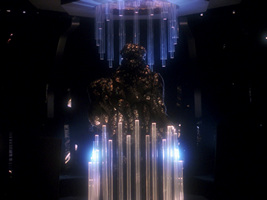
 "The Ensigns of Command"
"The Ensigns of Command"